
- Tips & Guides

How To Avoid Using “We,” “You,” And “I” in an Essay
- Posted on October 27, 2022 October 27, 2022
Maintaining a formal voice while writing academic essays and papers is essential to sound objective.
One of the main rules of academic or formal writing is to avoid first-person pronouns like “we,” “you,” and “I.” These words pull focus away from the topic and shift it to the speaker – the opposite of your goal.
While it may seem difficult at first, some tricks can help you avoid personal language and keep a professional tone.
Let’s learn how to avoid using “we” in an essay.
What Is a Personal Pronoun?
Pronouns are words used to refer to a noun indirectly. Examples include “he,” “his,” “her,” and “hers.” Any time you refer to a noun – whether a person, object, or animal – without using its name, you use a pronoun.
Personal pronouns are a type of pronoun. A personal pronoun is a pronoun you use whenever you directly refer to the subject of the sentence.
Take the following short paragraph as an example:
“Mr. Smith told the class yesterday to work on our essays. Mr. Smith also said that Mr. Smith lost Mr. Smith’s laptop in the lunchroom.”
The above sentence contains no pronouns at all. There are three places where you would insert a pronoun, but only two where you would put a personal pronoun. See the revised sentence below:
“Mr. Smith told the class yesterday to work on our essays. He also said that he lost his laptop in the lunchroom.”
“He” is a personal pronoun because we are talking directly about Mr. Smith. “His” is not a personal pronoun (it’s a possessive pronoun) because we are not speaking directly about Mr. Smith. Rather, we are talking about Mr. Smith’s laptop.
If later on you talk about Mr. Smith’s laptop, you may say:
“Mr. Smith found it in his car, not the lunchroom!”
In this case, “it” is a personal pronoun because in this point of view we are making a reference to the laptop directly and not as something owned by Mr. Smith.
Why Avoid Personal Pronouns in Essay Writing
We’re teaching you how to avoid using “I” in writing, but why is this necessary? Academic writing aims to focus on a clear topic, sound objective, and paint the writer as a source of authority. Word choice can significantly impact your success in achieving these goals.
Writing that uses personal pronouns can unintentionally shift the reader’s focus onto the writer, pulling their focus away from the topic at hand.
Personal pronouns may also make your work seem less objective.
One of the most challenging parts of essay writing is learning which words to avoid and how to avoid them. Fortunately, following a few simple tricks, you can master the English Language and write like a pro in no time.
Alternatives To Using Personal Pronouns
How to not use “I” in a paper? What are the alternatives? There are many ways to avoid the use of personal pronouns in academic writing. By shifting your word choice and sentence structure, you can keep the overall meaning of your sentences while re-shaping your tone.
Utilize Passive Voice
In conventional writing, students are taught to avoid the passive voice as much as possible, but it can be an excellent way to avoid first-person pronouns in academic writing.
You can use the passive voice to avoid using pronouns. Take this sentence, for example:
“ We used 150 ml of HCl for the experiment.”
Instead of using “we” and the active voice, you can use a passive voice without a pronoun. The sentence above becomes:
“150 ml of HCl were used for the experiment.”
Using the passive voice removes your team from the experiment and makes your work sound more objective.
Take a Third-Person Perspective
Another answer to “how to avoid using ‘we’ in an essay?” is the use of a third-person perspective. Changing the perspective is a good way to take first-person pronouns out of a sentence. A third-person point of view will not use any first-person pronouns because the information is not given from the speaker’s perspective.
A third-person sentence is spoken entirely about the subject where the speaker is outside of the sentence.
Take a look at the sentence below:
“In this article you will learn about formal writing.”
The perspective in that sentence is second person, and it uses the personal pronoun “you.” You can change this sentence to sound more objective by using third-person pronouns:
“In this article the reader will learn about formal writing.”
The use of a third-person point of view makes the second sentence sound more academic and confident. Second-person pronouns, like those used in the first sentence, sound less formal and objective.
Be Specific With Word Choice
You can avoid first-personal pronouns by choosing your words carefully. Often, you may find that you are inserting unnecessary nouns into your work.
Take the following sentence as an example:
“ My research shows the students did poorly on the test.”
In this case, the first-person pronoun ‘my’ can be entirely cut out from the sentence. It then becomes:
“Research shows the students did poorly on the test.”
The second sentence is more succinct and sounds more authoritative without changing the sentence structure.
You should also make sure to watch out for the improper use of adverbs and nouns. Being careful with your word choice regarding nouns, adverbs, verbs, and adjectives can help mitigate your use of personal pronouns.
“They bravely started the French revolution in 1789.”
While this sentence might be fine in a story about the revolution, an essay or academic piece should only focus on the facts. The world ‘bravely’ is a good indicator that you are inserting unnecessary personal pronouns into your work.
We can revise this sentence into:
“The French revolution started in 1789.”
Avoid adverbs (adjectives that describe verbs), and you will find that you avoid personal pronouns by default.
Closing Thoughts
In academic writing, It is crucial to sound objective and focus on the topic. Using personal pronouns pulls the focus away from the subject and makes writing sound subjective.
Hopefully, this article has helped you learn how to avoid using “we” in an essay.
When working on any formal writing assignment, avoid personal pronouns and informal language as much as possible.
While getting the hang of academic writing, you will likely make some mistakes, so revising is vital. Always double-check for personal pronouns, plagiarism , spelling mistakes, and correctly cited pieces.
You can prevent and correct mistakes using a plagiarism checker at any time, completely for free.
Quetext is a platform that helps you with all those tasks. Check out all resources that are available to you today.
Sign Up for Quetext Today!
Click below to find a pricing plan that fits your needs.
You May Also Like

Encouraging Proper Citation Practices: Tips for Teaching Students How to Cite Sources Correctly and Ethically
- Posted on July 22, 2024

A Guide to Paraphrasing Poetry, With Examples
- Posted on July 12, 2024

Preparing Students for the Future: AI Literacy and Digital Citizenship
- Posted on July 5, 2024

How to Summarize a Paper, a Story, a Book, a Report or an Essay
- Posted on June 25, 2024 June 25, 2024

How to Use AI to Enhance Your Storytelling Process
- Posted on June 12, 2024

Essential Comma Rules for Business Emails
- Posted on June 7, 2024

How to Write Polished, Professional Emails With AI
- Posted on May 30, 2024

A Safer Learning Environment: The Impact of AI Detection on School Security
- Posted on May 17, 2024
Input your search keywords and press Enter.

10 Better Ways To Say “Our” And “We” In Formal Essays
When writing formal essays, there are rules of English grammar that we need to follow. Sometimes, we need to change perspective, and instead of writing in the first person and saying ‘we,’ we need to stay in the third person. So, what are the best alternatives to saying ‘we?’
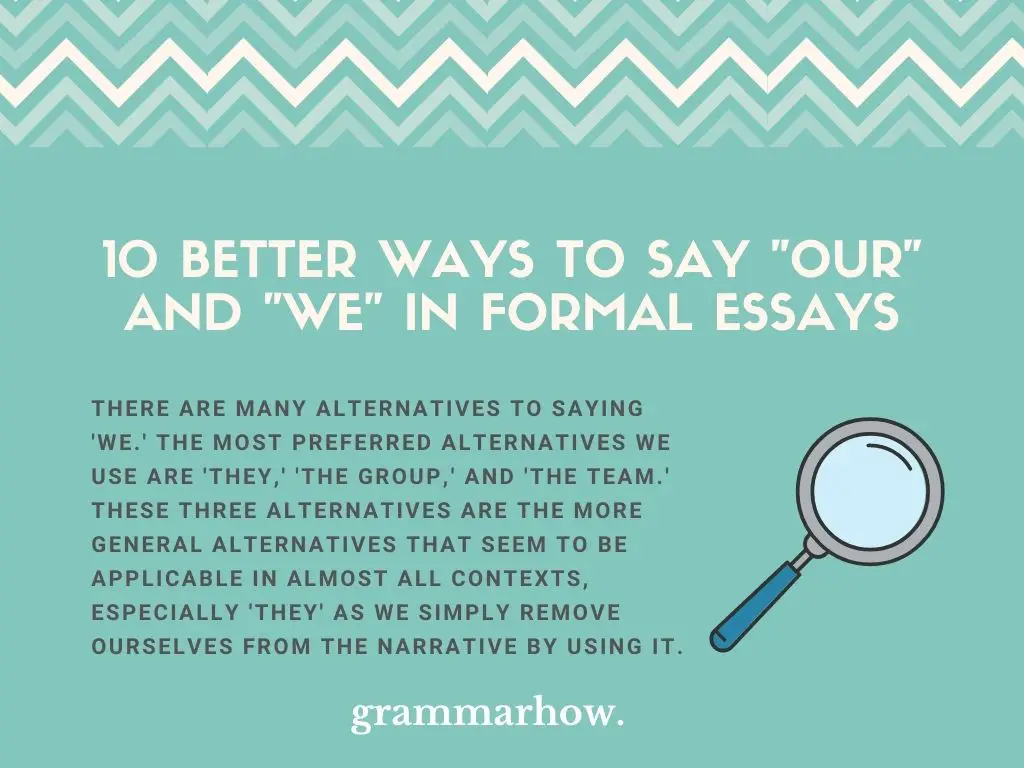
There are many alternatives to saying ‘we.’ The most preferred alternatives we use are ‘they,’ ‘the group,’ and ‘the team.’ These three alternatives are the more general alternatives that seem to be applicable in almost all contexts, especially ‘they’ as we simply remove ourselves from the narrative by using it.
‘They’ is the most general and preferred alternative to ‘we’ and ‘us.’ By using ‘they,’ we replace our first-person pronoun with a third-person pronoun that simply excludes ourselves from the narrative, making the essay sound more objective and formal. ‘They’ is also a pronoun that is applicable in all contexts.
Take a look at these examples below.
- Original: Humans are incredible creatures. We have so much creativity.
- Alternative: Humans are incredible creatures. They have so much creativity.
- Original: Our group will report tomorrow. We will talk about this month’s sales.
- Alternative: Their group will report tomorrow. They will talk about this month’s sales.
- Original: We simply hope the audience learned something from us.
- Alternative: They simply hope the audience learned something from them.
- Original: We’ve done our research, but we don’t have precise predictions yet.
- Alternative: They’ve done their research, but they don’t have precise predictions yet.
‘The group’ is a good, general alternative to saying ‘we’ in formal essays. However, this alternative specifies that we refer to ‘we’ as a group of individuals. Therefore, this alternative does not apply to populations of large scale like nations, humans, or races.
- Original: We were able to conclude the following findings.
- Alternative: The group was able to conclude the following findings.
- Original: We could not administer the test today due to certain circumstances.
- Alternative: The group could not administer the test today due to certain circumstances?
- Original: Our experimental set-ups did not yield any significant difference.
- Alternative: The group’s experimental set-ups did not yield any significant difference.
- Original: It is beneficial for us if more people participate in the study.
- Alternative: It is beneficial for the group if more people participate in the study.
‘The team’ is synonymous with ‘the group.’ It is another alternative to saying ‘we’ but implies that ‘we’ refers to a team or a group of individuals that are together for the same purpose. However, ‘the team’ does not apply to bigger populations, like an entire race or human population.
- Original: We are composed of individuals with a passion for learning.
- Alternative: The team is composed of individuals with a passion for learning.
- Original: The results of our work do not define our identity.
- Alternative: The results of the team’s work do not define the team’s identity.
- Original: We poured our best efforts into this project.
- Alternative: The team poured their best efforts into this project.
- Original: We do not tolerate any misconduct and violent behavior.
- Alternative: The team does not tolerate any misconduct and violent behavior.
‘The body’ is another alternative for saying ‘we’ in formal essays. We mostly use ‘body’ when referring to large groups of individuals like the audience, spectators, or students. However, we do not use it for extreme scales such as a race population, and the like.
- Original: We didn’t find the presentation interesting.
- Alternative: The body didn’t find the presentation interesting.
- Original: We have a lot of questions we want to ask the speaker after the talk.
- Alternative: The body has a lot of questions they want to ask the speaker after the talk.
- Original: We listened to different opinions on the issue.
- Alternative: The body listened to different opinions on the issue.
- Original: We were only able to watch the latter part of the program.
- Alternative: The body was only able to watch the latter part of the program.
The Organization
‘The organization’ is a more specific alternative for ‘we.’ In using this alternative, we refer to ‘we’ as an organization in the context we are talking or writing. This alternative is most applicable for organization-related things. However, do not use this alternative if the context does not involve an organization.
- Original: We will push through with the planned fundraising project.
- Alternative: The organization will push through with the planned fundraising project.
- Original: Our accomplishments this year are something we should be proud of.
- Alternative: The organization’s accomplishments this year are something they should be proud of.
- Original: We plan on collaborating with other organizations to plan the event.
- Alternative: The organization plans on collaborating with other organizations to plan the event.
- Original: We only accept people who have a passion for our advocacy.
- Alternative: The organization only accepts people who have a passion for their advocacy.
The Researchers
‘The researchers’ is a specific alternative to ‘we’ that we only use when we refer to ‘we’ as a group of researchers. We mostly use this alternative in writing research papers that need to be in the third-person perspective. However, we don’t use this alternative outside the scope of research.
- Original: We administered a total of three set-ups for the study.
- Alternative: The researchers administered a total of three set-ups for the study.
- Original: We encountered circumstances that provided the limitations of our research.
- Alternative: The researchers encountered circumstances that provided the limitations of their research.
- Original: After three months of observation, our conclusion is as follows.
- Alternative: After three months of observation, the researchers’ conclusion is as follows.
- Original: Our study would not be successful if not for the help of our research adviser.
- Alternative: The researchers’ study would not be successful if not for the help of their research adviser.
The Company
‘The company’ is another specific alternative for ‘we.’ We only use this alternative, if we are in the context that ‘we’ refers to a company. We use this mostly in business-related reports or presentations. Other than that, we don’t use this alternative for purposes that do not involve a company.
- Original: Our sales for this month are higher than last month.
- Alternative: The company’s sales for this month are higher than last month.
- Original: We only sell organic, vegan-friendly, and cruelty-free products.
- Alternative: The company only sells organic, vegan-friendly, and cruelty-free products.
- Original: We need to continuously track our demand and supply levels.
- Alternative: The company needs to continuously track its demand and supply levels.
- Original: Our vision and mission should guide us in all our endeavors.
- Alternative: The company’s vision and mission should guide the company in all its endeavors.
The Association
‘The association’ is also a specific alternative to ‘we.’ We only use this alternative if we are in a context to talk as part of or within an association. However, we do not use this alternative if we are not talking about, for, or as part of an association.
- Original: We will hold meetings every Friday to discuss weekly matters.
- Alternative: The association will hold meetings every Friday to discuss weekly matters.
- Original: Our job is to advocate and uphold democracy in our country.
- Alternative: The association’s job is to advocate and uphold democracy in our country.
- Original: Our goal directs the objectives of every endeavor we take care of.
- Alternative: The association’s goal directs the objectives of every endeavor it takes care of.
- Original: We are open to expanding the scope of its initiatives.
- Alternative: The association is open to expanding the scope of its initiatives.
‘Humans’ is a specific alternative for ‘we’ that we use only when we refer to ‘we’ as the entire human population. We cannot use ‘humans’ for small-scale groups like researchers or a company. We use this alternative only when we regard ‘we’ as the entire human population.
Take a look at the examples below.
- Original: We have so much potential inside us.
- Alternative: Humans have so much potential inside them.
- Original: Sometimes, even 24 hours isn’t enough for what we want to do in a day.
- Alternative: Sometimes, even 24 hours isn’t enough for what humans want to do in a day.
- Original: All of us have a desire to accomplish something in our lives.
- Alternative: All humans have a desire to accomplish something in their lives.
- Original: We cannot live without one another.
- Alternative: Humans cannot live without one another.
‘Society’ or ‘the society’ is an alternative to ‘we’ that we use when referring to ‘we’ as the society we are part of, or we are in. Like ‘humans,’ we do not use ‘society’ for small-scale groups, and we can only use this alternative for anything that involves our society.
- Original: We are so cruel towards others sometimes.
- Alternative: Society is so cruel towards others sometimes.
- Original: We have reached far and accomplished a lot collectively.
- Alternative: Society has reached far and accomplished a lot collectively.
- Original: Sometimes, we put up unrealistic standards for ourselves and for others.
- Alternative: Sometimes, society puts up unrealistic standards for oneself and for others.
- Original: We should start accepting everyone for who they are.
- Alternative: Society should start accepting everyone for who they are.
Is It Appropriate To Use ‘Our’ And ‘We’ In Formal Essays?
Whether to use ‘we’ or not depends on how formal you want your essay to be or how formal it needs to be. Some formal essays allow the use of first-person pronouns like ‘we’ and ‘us.’ However, omitting these pronouns do make your essays sound more professional, formal, and objective.

Martin holds a Master’s degree in Finance and International Business. He has six years of experience in professional communication with clients, executives, and colleagues. Furthermore, he has teaching experience from Aarhus University. Martin has been featured as an expert in communication and teaching on Forbes and Shopify. Read more about Martin here .
- Research On or In – Which Is Correct?
- What Are Power Dynamics? (Meaning & Examples)
- 10 Words For Working Together Towards A Common Goal
- Work On/In/With A Team – Preposition Guide (With Examples)

The “no first-person” myth

- First-Person Pronouns
- Research and Publication

In this series, we look at common APA Style misconceptions and debunk these myths one by one.
Many writers believe the “no first-person” myth, which is that writers cannot use first-person pronouns such as “I” or “we” in an APA Style paper. This myth implies that writers must instead refer to themselves in the third person (e.g., as “the author” or “the authors”). However, APA Style has no such rule against using first-person pronouns and actually encourages their use to avoid ambiguity in attribution!
When expressing your own views or the views of yourself and fellow authors, use the pronouns “I” or “we” and the like . Similarly, when writing your paper, use first-person pronouns when describing work you did by yourself or work you and your fellow authors did together when conducting your research. For example, use “we interviewed participants” rather than “the authors interviewed participants.” When writing an APA Style paper by yourself, use the first-person pronoun “I” to refer to yourself. And use the pronoun “we” when writing an APA Style paper with others. Here are some phrases you might use in your paper:
“I think…” “I believe…” “I interviewed the participants…” “I analyzed the data…” “My analysis of the data revealed…” “We concluded…” “Our results showed…”
This guidance can be found in Section 4.16 of the Publication Manual of the American Psychological Association, Seventh Edition and in Section 2.16 of the Concise Guide to APA Style, Seventh Edition . It represents a continuation of a long-standing APA Style guideline that began with the second edition of the manual, in 1974.
Keep in mind that you should avoid using the editorial “we” to refer to people in general so that it is clear to readers to whom you are referring. Instead, use more specific nouns such as “people” or “researchers.”
As always, defer to your instructors’ guidelines when writing student papers. For example, your instructor may ask students to avoid using first-person language. If so, follow that guideline for work in your class.
Now that we’ve debunked another myth, go forth APA Style writers, using the first-person when appropriate!
What myth should we debunk next? Leave a comment below.
Related and recent
Comments are disabled due to your privacy settings. To re-enable, please adjust your cookie preferences.
APA Style Monthly
Subscribe to the APA Style Monthly newsletter to get tips, updates, and resources delivered directly to your inbox.
Welcome! Thank you for subscribing.
APA Style Guidelines
Browse APA Style writing guidelines by category
- Abbreviations
- Bias-Free Language
- Capitalization
- In-Text Citations
- Italics and Quotation Marks
- Paper Format
- Punctuation
- Spelling and Hyphenation
- Tables and Figures
Full index of topics

Should I Use “I”?
What this handout is about.
This handout is about determining when to use first person pronouns (“I”, “we,” “me,” “us,” “my,” and “our”) and personal experience in academic writing. “First person” and “personal experience” might sound like two ways of saying the same thing, but first person and personal experience can work in very different ways in your writing. You might choose to use “I” but not make any reference to your individual experiences in a particular paper. Or you might include a brief description of an experience that could help illustrate a point you’re making without ever using the word “I.” So whether or not you should use first person and personal experience are really two separate questions, both of which this handout addresses. It also offers some alternatives if you decide that either “I” or personal experience isn’t appropriate for your project. If you’ve decided that you do want to use one of them, this handout offers some ideas about how to do so effectively, because in many cases using one or the other might strengthen your writing.
Expectations about academic writing
Students often arrive at college with strict lists of writing rules in mind. Often these are rather strict lists of absolutes, including rules both stated and unstated:
- Each essay should have exactly five paragraphs.
- Don’t begin a sentence with “and” or “because.”
- Never include personal opinion.
- Never use “I” in essays.
We get these ideas primarily from teachers and other students. Often these ideas are derived from good advice but have been turned into unnecessarily strict rules in our minds. The problem is that overly strict rules about writing can prevent us, as writers, from being flexible enough to learn to adapt to the writing styles of different fields, ranging from the sciences to the humanities, and different kinds of writing projects, ranging from reviews to research.
So when it suits your purpose as a scholar, you will probably need to break some of the old rules, particularly the rules that prohibit first person pronouns and personal experience. Although there are certainly some instructors who think that these rules should be followed (so it is a good idea to ask directly), many instructors in all kinds of fields are finding reason to depart from these rules. Avoiding “I” can lead to awkwardness and vagueness, whereas using it in your writing can improve style and clarity. Using personal experience, when relevant, can add concreteness and even authority to writing that might otherwise be vague and impersonal. Because college writing situations vary widely in terms of stylistic conventions, tone, audience, and purpose, the trick is deciphering the conventions of your writing context and determining how your purpose and audience affect the way you write. The rest of this handout is devoted to strategies for figuring out when to use “I” and personal experience.
Effective uses of “I”:
In many cases, using the first person pronoun can improve your writing, by offering the following benefits:
- Assertiveness: In some cases you might wish to emphasize agency (who is doing what), as for instance if you need to point out how valuable your particular project is to an academic discipline or to claim your unique perspective or argument.
- Clarity: Because trying to avoid the first person can lead to awkward constructions and vagueness, using the first person can improve your writing style.
- Positioning yourself in the essay: In some projects, you need to explain how your research or ideas build on or depart from the work of others, in which case you’ll need to say “I,” “we,” “my,” or “our”; if you wish to claim some kind of authority on the topic, first person may help you do so.
Deciding whether “I” will help your style
Here is an example of how using the first person can make the writing clearer and more assertive:
Original example:
In studying American popular culture of the 1980s, the question of to what degree materialism was a major characteristic of the cultural milieu was explored.
Better example using first person:
In our study of American popular culture of the 1980s, we explored the degree to which materialism characterized the cultural milieu.
The original example sounds less emphatic and direct than the revised version; using “I” allows the writers to avoid the convoluted construction of the original and clarifies who did what.
Here is an example in which alternatives to the first person would be more appropriate:
As I observed the communication styles of first-year Carolina women, I noticed frequent use of non-verbal cues.
Better example:
A study of the communication styles of first-year Carolina women revealed frequent use of non-verbal cues.
In the original example, using the first person grounds the experience heavily in the writer’s subjective, individual perspective, but the writer’s purpose is to describe a phenomenon that is in fact objective or independent of that perspective. Avoiding the first person here creates the desired impression of an observed phenomenon that could be reproduced and also creates a stronger, clearer statement.
Here’s another example in which an alternative to first person works better:
As I was reading this study of medieval village life, I noticed that social class tended to be clearly defined.
This study of medieval village life reveals that social class tended to be clearly defined.
Although you may run across instructors who find the casual style of the original example refreshing, they are probably rare. The revised version sounds more academic and renders the statement more assertive and direct.
Here’s a final example:
I think that Aristotle’s ethical arguments are logical and readily applicable to contemporary cases, or at least it seems that way to me.
Better example
Aristotle’s ethical arguments are logical and readily applicable to contemporary cases.
In this example, there is no real need to announce that that statement about Aristotle is your thought; this is your paper, so readers will assume that the ideas in it are yours.
Determining whether to use “I” according to the conventions of the academic field
Which fields allow “I”?
The rules for this are changing, so it’s always best to ask your instructor if you’re not sure about using first person. But here are some general guidelines.
Sciences: In the past, scientific writers avoided the use of “I” because scientists often view the first person as interfering with the impression of objectivity and impersonality they are seeking to create. But conventions seem to be changing in some cases—for instance, when a scientific writer is describing a project she is working on or positioning that project within the existing research on the topic. Check with your science instructor to find out whether it’s o.k. to use “I” in their class.
Social Sciences: Some social scientists try to avoid “I” for the same reasons that other scientists do. But first person is becoming more commonly accepted, especially when the writer is describing their project or perspective.
Humanities: Ask your instructor whether you should use “I.” The purpose of writing in the humanities is generally to offer your own analysis of language, ideas, or a work of art. Writers in these fields tend to value assertiveness and to emphasize agency (who’s doing what), so the first person is often—but not always—appropriate. Sometimes writers use the first person in a less effective way, preceding an assertion with “I think,” “I feel,” or “I believe” as if such a phrase could replace a real defense of an argument. While your audience is generally interested in your perspective in the humanities fields, readers do expect you to fully argue, support, and illustrate your assertions. Personal belief or opinion is generally not sufficient in itself; you will need evidence of some kind to convince your reader.
Other writing situations: If you’re writing a speech, use of the first and even the second person (“you”) is generally encouraged because these personal pronouns can create a desirable sense of connection between speaker and listener and can contribute to the sense that the speaker is sincere and involved in the issue. If you’re writing a resume, though, avoid the first person; describe your experience, education, and skills without using a personal pronoun (for example, under “Experience” you might write “Volunteered as a peer counselor”).
A note on the second person “you”:
In situations where your intention is to sound conversational and friendly because it suits your purpose, as it does in this handout intended to offer helpful advice, or in a letter or speech, “you” might help to create just the sense of familiarity you’re after. But in most academic writing situations, “you” sounds overly conversational, as for instance in a claim like “when you read the poem ‘The Wasteland,’ you feel a sense of emptiness.” In this case, the “you” sounds overly conversational. The statement would read better as “The poem ‘The Wasteland’ creates a sense of emptiness.” Academic writers almost always use alternatives to the second person pronoun, such as “one,” “the reader,” or “people.”
Personal experience in academic writing
The question of whether personal experience has a place in academic writing depends on context and purpose. In papers that seek to analyze an objective principle or data as in science papers, or in papers for a field that explicitly tries to minimize the effect of the researcher’s presence such as anthropology, personal experience would probably distract from your purpose. But sometimes you might need to explicitly situate your position as researcher in relation to your subject of study. Or if your purpose is to present your individual response to a work of art, to offer examples of how an idea or theory might apply to life, or to use experience as evidence or a demonstration of an abstract principle, personal experience might have a legitimate role to play in your academic writing. Using personal experience effectively usually means keeping it in the service of your argument, as opposed to letting it become an end in itself or take over the paper.
It’s also usually best to keep your real or hypothetical stories brief, but they can strengthen arguments in need of concrete illustrations or even just a little more vitality.
Here are some examples of effective ways to incorporate personal experience in academic writing:
- Anecdotes: In some cases, brief examples of experiences you’ve had or witnessed may serve as useful illustrations of a point you’re arguing or a theory you’re evaluating. For instance, in philosophical arguments, writers often use a real or hypothetical situation to illustrate abstract ideas and principles.
- References to your own experience can explain your interest in an issue or even help to establish your authority on a topic.
- Some specific writing situations, such as application essays, explicitly call for discussion of personal experience.
Here are some suggestions about including personal experience in writing for specific fields:
Philosophy: In philosophical writing, your purpose is generally to reconstruct or evaluate an existing argument, and/or to generate your own. Sometimes, doing this effectively may involve offering a hypothetical example or an illustration. In these cases, you might find that inventing or recounting a scenario that you’ve experienced or witnessed could help demonstrate your point. Personal experience can play a very useful role in your philosophy papers, as long as you always explain to the reader how the experience is related to your argument. (See our handout on writing in philosophy for more information.)
Religion: Religion courses might seem like a place where personal experience would be welcomed. But most religion courses take a cultural, historical, or textual approach, and these generally require objectivity and impersonality. So although you probably have very strong beliefs or powerful experiences in this area that might motivate your interest in the field, they shouldn’t supplant scholarly analysis. But ask your instructor, as it is possible that they are interested in your personal experiences with religion, especially in less formal assignments such as response papers. (See our handout on writing in religious studies for more information.)
Literature, Music, Fine Arts, and Film: Writing projects in these fields can sometimes benefit from the inclusion of personal experience, as long as it isn’t tangential. For instance, your annoyance over your roommate’s habits might not add much to an analysis of “Citizen Kane.” However, if you’re writing about Ridley Scott’s treatment of relationships between women in the movie “Thelma and Louise,” some reference your own observations about these relationships might be relevant if it adds to your analysis of the film. Personal experience can be especially appropriate in a response paper, or in any kind of assignment that asks about your experience of the work as a reader or viewer. Some film and literature scholars are interested in how a film or literary text is received by different audiences, so a discussion of how a particular viewer or reader experiences or identifies with the piece would probably be appropriate. (See our handouts on writing about fiction , art history , and drama for more information.)
Women’s Studies: Women’s Studies classes tend to be taught from a feminist perspective, a perspective which is generally interested in the ways in which individuals experience gender roles. So personal experience can often serve as evidence for your analytical and argumentative papers in this field. This field is also one in which you might be asked to keep a journal, a kind of writing that requires you to apply theoretical concepts to your experiences.
History: If you’re analyzing a historical period or issue, personal experience is less likely to advance your purpose of objectivity. However, some kinds of historical scholarship do involve the exploration of personal histories. So although you might not be referencing your own experience, you might very well be discussing other people’s experiences as illustrations of their historical contexts. (See our handout on writing in history for more information.)
Sciences: Because the primary purpose is to study data and fixed principles in an objective way, personal experience is less likely to have a place in this kind of writing. Often, as in a lab report, your goal is to describe observations in such a way that a reader could duplicate the experiment, so the less extra information, the better. Of course, if you’re working in the social sciences, case studies—accounts of the personal experiences of other people—are a crucial part of your scholarship. (See our handout on writing in the sciences for more information.)
You may reproduce it for non-commercial use if you use the entire handout and attribute the source: The Writing Center, University of North Carolina at Chapel Hill
Make a Gift
- Link to facebook
- Link to linkedin
- Link to twitter
- Link to youtube
- Writing Tips
Can You Use I or We in a Research Paper?
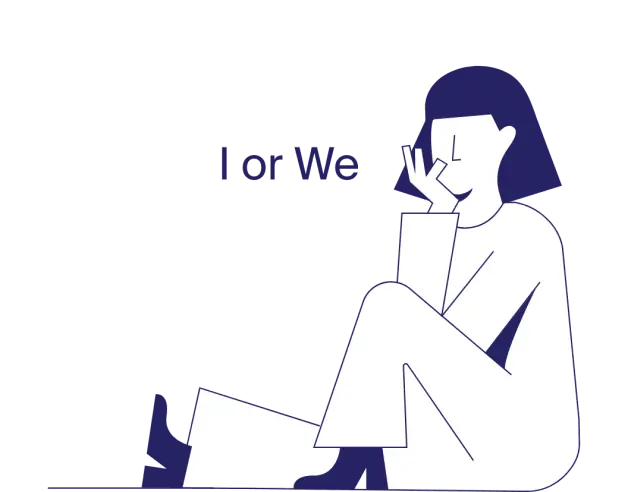
4-minute read
- 11th July 2023
Writing in the first person, or using I and we pronouns, has traditionally been frowned upon in academic writing . But despite this long-standing norm, writing in the first person isn’t actually prohibited. In fact, it’s becoming more acceptable – even in research papers.
If you’re wondering whether you can use I (or we ) in your research paper, you should check with your institution first and foremost. Many schools have rules regarding first-person use. If it’s up to you, though, we still recommend some guidelines. Check out our tips below!
When Is It Most Acceptable to Write in the First Person?
Certain sections of your paper are more conducive to writing in the first person. Typically, the first person makes sense in the abstract, introduction, discussion, and conclusion sections. You should still limit your use of I and we , though, or your essay may start to sound like a personal narrative .
Using first-person pronouns is most useful and acceptable in the following circumstances.
When doing so removes the passive voice and adds flow
Sometimes, writers have to bend over backward just to avoid using the first person, often producing clunky sentences and a lot of passive voice constructions. The first person can remedy this. For example:
Both sentences are fine, but the second one flows better and is easier to read.
When doing so differentiates between your research and other literature
When discussing literature from other researchers and authors, you might be comparing it with your own findings or hypotheses . Using the first person can help clarify that you are engaging in such a comparison. For example:
In the first sentence, using “the author” to avoid the first person creates ambiguity. The second sentence prevents misinterpretation.
When doing so allows you to express your interest in the subject
In some instances, you may need to provide background for why you’re researching your topic. This information may include your personal interest in or experience with the subject, both of which are easier to express using first-person pronouns. For example:
Expressing personal experiences and viewpoints isn’t always a good idea in research papers. When it’s appropriate to do so, though, just make sure you don’t overuse the first person.
When to Avoid Writing in the First Person
It’s usually a good idea to stick to the third person in the methods and results sections of your research paper. Additionally, be careful not to use the first person when:
Find this useful?
Subscribe to our newsletter and get writing tips from our editors straight to your inbox.
● It makes your findings seem like personal observations rather than factual results.
● It removes objectivity and implies that the writing may be biased .
● It appears in phrases such as I think or I believe , which can weaken your writing.
Keeping Your Writing Formal and Objective
Using the first person while maintaining a formal tone can be tricky, but keeping a few tips in mind can help you strike a balance. The important thing is to make sure the tone isn’t too conversational.
To achieve this, avoid referring to the readers, such as with the second-person you . Use we and us only when referring to yourself and the other authors/researchers involved in the paper, not the audience.
It’s becoming more acceptable in the academic world to use first-person pronouns such as we and I in research papers. But make sure you check with your instructor or institution first because they may have strict rules regarding this practice.
If you do decide to use the first person, make sure you do so effectively by following the tips we’ve laid out in this guide. And once you’ve written a draft, send us a copy! Our expert proofreaders and editors will be happy to check your grammar, spelling, word choice, references, tone, and more. Submit a 500-word sample today!
Is it ever acceptable to use I or we in a research paper?
In some instances, using first-person pronouns can help you to establish credibility, add clarity, and make the writing easier to read.
How can I avoid using I in my writing?
Writing in the passive voice can help you to avoid using the first person.
Share this article:
Post A New Comment
Got content that needs a quick turnaround? Let us polish your work. Explore our editorial business services.
6-minute read
How to Write a Nonprofit Grant Proposal
If you’re seeking funding to support your charitable endeavors as a nonprofit organization, you’ll need...
9-minute read
How to Use Infographics to Boost Your Presentation
Is your content getting noticed? Capturing and maintaining an audience’s attention is a challenge when...
8-minute read
Why Interactive PDFs Are Better for Engagement
Are you looking to enhance engagement and captivate your audience through your professional documents? Interactive...
7-minute read
Seven Key Strategies for Voice Search Optimization
Voice search optimization is rapidly shaping the digital landscape, requiring content professionals to adapt their...
Five Creative Ways to Showcase Your Digital Portfolio
Are you a creative freelancer looking to make a lasting impression on potential clients or...
How to Ace Slack Messaging for Contractors and Freelancers
Effective professional communication is an important skill for contractors and freelancers navigating remote work environments....

Make sure your writing is the best it can be with our expert English proofreading and editing.
Using “I” in Academic Writing
Traditionally, some fields have frowned on the use of the first-person singular in an academic essay and others have encouraged that use, and both the frowning and the encouraging persist today—and there are good reasons for both positions (see “Should I”).
I recommend that you not look on the question of using “I” in an academic paper as a matter of a rule to follow, as part of a political agenda (see webb), or even as the need to create a strategy to avoid falling into Scylla-or-Charybdis error. Let the first-person singular be, instead, a tool that you take out when you think it’s needed and that you leave in the toolbox when you think it’s not.
Examples of When “I” May Be Needed
- You are narrating how you made a discovery, and the process of your discovering is important or at the very least entertaining.
- You are describing how you teach something and how your students have responded or respond.
- You disagree with another scholar and want to stress that you are not waving the banner of absolute truth.
- You need “I” for rhetorical effect, to be clear, simple, or direct.
Examples of When “I” Should Be Given a Rest
- It’s off-putting to readers, generally, when “I” appears too often. You may not feel one bit modest, but remember the advice of Benjamin Franklin, still excellent, on the wisdom of preserving the semblance of modesty when your purpose is to convince others.
- You are the author of your paper, so if an opinion is expressed in it, it is usually clear that this opinion is yours. You don’t have to add a phrase like, “I believe” or “it seems to me.”
Works Cited
Franklin, Benjamin. The Autobiography of Benjamin Franklin . Project Gutenberg , 28 Dec. 2006, www.gutenberg.org/app/uploads/sites/3/20203/20203-h/20203-h.htm#I.
“Should I Use “I”?” The Writing Center at UNC—Chapel Hill , writingcenter.unc.edu/handouts/should-i-use-i/.
webb, Christine. “The Use of the First Person in Academic Writing: Objectivity, Language, and Gatekeeping.” ResearchGate , July 1992, doi: 10.1111/j.1365-2648.1992.tb01974.x.
J.S.Beniwal 05 August 2017 AT 09:08 AM
I have borrowed MLA only yesterday, did my MAEnglish in May 2017.MLA is of immense help for scholars.An overview of the book really enlightened me.I should have read it at bachelor's degree level.
Your e-mail address will not be published
Dr. Raymond Harter 25 September 2017 AT 02:09 PM
I discourage the use of "I" in essays for undergraduates to reinforce a conversational tone and to "self-recognize" the writer as an authority or at least a thorough researcher. Writing a play is different than an essay with a purpose.
Osayimwense Osa 22 March 2023 AT 05:03 PM
When a student or writer is strongly and passionately interested in his or her stance and argument to persuade his or her audience, the use of personal pronoun srenghtens his or her passion for the subject. This passion should be clear in his/her expression. However, I encourage the use of the first-person, I, sparingly -- only when and where absolutely necessary.
Eleanor 25 March 2023 AT 04:03 PM
I once had a student use the word "eye" when writing about how to use pronouns. Her peers did not catch it. I made comments, but I think she never understood what eye was saying!
Join the Conversation
We invite you to comment on this post and exchange ideas with other site visitors. Comments are moderated and subject to terms of service.
If you have a question for the MLA's editors, submit it to Ask the MLA!
Encyclopedia
Writing with artificial intelligence, using first person in an academic essay: when is it okay.
- CC BY-NC-ND 4.0 by Jenna Pack Sheffield

Related Concepts: Academic Writing – How to Write for the Academic Community ; First-Person Point of View ; Rhetorical Analysis; Rhetorical Stance ; The First Person ; Voice
In order to determine whether or not you can speak or write from the first-person point of view, you need to engage in rhetorical analysis. You need to question whether your audience values and accepts the first person as a legitimate rhetorical stance. Source:Many times, high school students are told not to use first person (“I,” “we,” “my,” “us,” and so forth) in their essays. As a college student, you should realize that this is a rule that can and should be broken—at the right time, of course.
By now, you’ve probably written a personal essay, memoir, or narrative that used first person. After all, how could you write a personal essay about yourself, for instance, without using the dreaded “I” word?
However, academic essays differ from personal essays; they are typically researched and use a formal tone . Because of these differences, when students write an academic essay, they quickly shy away from first person because of what they have been told in high school or because they believe that first person feels too informal for an intellectual, researched text. While first person can definitely be overused in academic essays (which is likely why your teachers tell you not to use it), there are moments in a paper when it is not only appropriate, but also more effective and/or persuasive to use first person. The following are a few instances in which it is appropriate to use first person in an academic essay:
- Including a personal anecdote: You have more than likely been told that you need a strong “hook” to draw your readers in during an introduction. Sometimes, the best hook is a personal anecdote, or a short amusing story about yourself. In this situation, it would seem unnatural not to use first-person pronouns such as “I” and “myself.” Your readers will appreciate the personal touch and will want to keep reading! (For more information about incorporating personal anecdotes into your writing, see “ Employing Narrative in an Essay .”)
- Establishing your credibility ( ethos ): Ethos is a term stemming back to Ancient Greece that essentially means “character” in the sense of trustworthiness or credibility. A writer can establish her ethos by convincing the reader that she is trustworthy source. Oftentimes, the best way to do that is to get personal—tell the reader a little bit about yourself. (For more information about ethos, see “ Ethos .”)For instance, let’s say you are writing an essay arguing that dance is a sport. Using the occasional personal pronoun to let your audience know that you, in fact, are a classically trained dancer—and have the muscles and scars to prove it—goes a long way in establishing your credibility and proving your argument. And this use of first person will not distract or annoy your readers because it is purposeful.
- Clarifying passive constructions : Often, when writers try to avoid using first person in essays, they end up creating confusing, passive sentences . For instance, let’s say I am writing an essay about different word processing technologies, and I want to make the point that I am using Microsoft Word to write this essay. If I tried to avoid first-person pronouns, my sentence might read: “Right now, this essay is being written in Microsoft Word.” While this sentence is not wrong, it is what we call passive—the subject of the sentence is being acted upon because there is no one performing the action. To most people, this sentence sounds better: “Right now, I am writing this essay in Microsoft Word.” Do you see the difference? In this case, using first person makes your writing clearer.
- Stating your position in relation to others: Sometimes, especially in an argumentative essay, it is necessary to state your opinion on the topic . Readers want to know where you stand, and it is sometimes helpful to assert yourself by putting your own opinions into the essay. You can imagine the passive sentences (see above) that might occur if you try to state your argument without using the word “I.” The key here is to use first person sparingly. Use personal pronouns enough to get your point across clearly without inundating your readers with this language.
Now, the above list is certainly not exhaustive. The best thing to do is to use your good judgment, and you can always check with your instructor if you are unsure of his or her perspective on the issue. Ultimately, if you feel that using first person has a purpose or will have a strategic effect on your audience, then it is probably fine to use first-person pronouns. Just be sure not to overuse this language, at the risk of sounding narcissistic, self-centered, or unaware of others’ opinions on a topic.
Recommended Readings:
- A Synthesis of Professor Perspectives on Using First and Third Person in Academic Writing
- Finding the Bunny: How to Make a Personal Connection to Your Writing
- First-Person Point of View

Brevity – Say More with Less

Clarity (in Speech and Writing)

Coherence – How to Achieve Coherence in Writing

Flow – How to Create Flow in Writing

Inclusivity – Inclusive Language

The Elements of Style – The DNA of Powerful Writing

Suggested Edits
- Please select the purpose of your message. * - Corrections, Typos, or Edits Technical Support/Problems using the site Advertising with Writing Commons Copyright Issues I am contacting you about something else
- Your full name
- Your email address *
- Page URL needing edits *
- Name This field is for validation purposes and should be left unchanged.
Featured Articles

Academic Writing – How to Write for the Academic Community

Professional Writing – How to Write for the Professional World

Credibility & Authority – How to Be Credible & Authoritative in Research, Speech & Writing
- Affiliate Program

- UNITED STATES
- 台灣 (TAIWAN)
- TÜRKIYE (TURKEY)
- Academic Editing Services
- - Research Paper
- - Journal Manuscript
- - Dissertation
- - College & University Assignments
- Admissions Editing Services
- - Application Essay
- - Personal Statement
- - Recommendation Letter
- - Cover Letter
- - CV/Resume
- Business Editing Services
- - Business Documents
- - Report & Brochure
- - Website & Blog
- Writer Editing Services
- - Script & Screenplay
- Our Editors
- Client Reviews
- Editing & Proofreading Prices
- Wordvice Points
- Partner Discount
- Plagiarism Checker
- APA Citation Generator
- MLA Citation Generator
- Chicago Citation Generator
- Vancouver Citation Generator
- - APA Style
- - MLA Style
- - Chicago Style
- - Vancouver Style
- Writing & Editing Guide
- Academic Resources
- Admissions Resources
Can You Use First-Person Pronouns (I/we) in a Research Paper?
Research writers frequently wonder whether the first person can be used in academic and scientific writing. In truth, for generations, we’ve been discouraged from using “I” and “we” in academic writing simply due to old habits. That’s right—there’s no reason why you can’t use these words! In fact, the academic community used first-person pronouns until the 1920s, when the third person and passive-voice constructions (that is, “boring” writing) were adopted–prominently expressed, for example, in Strunk and White’s classic writing manual “Elements of Style” first published in 1918, that advised writers to place themselves “in the background” and not draw attention to themselves.
In recent decades, however, changing attitudes about the first person in academic writing has led to a paradigm shift, and we have, however, we’ve shifted back to producing active and engaging prose that incorporates the first person.
Can You Use “I” in a Research Paper?
However, “I” and “we” still have some generally accepted pronoun rules writers should follow. For example, the first person is more likely used in the abstract , Introduction section , Discussion section , and Conclusion section of an academic paper while the third person and passive constructions are found in the Methods section and Results section .
In this article, we discuss when you should avoid personal pronouns and when they may enhance your writing.
It’s Okay to Use First-Person Pronouns to:
- clarify meaning by eliminating passive voice constructions;
- establish authority and credibility (e.g., assert ethos, the Aristotelian rhetorical term referring to the personal character);
- express interest in a subject matter (typically found in rapid correspondence);
- establish personal connections with readers, particularly regarding anecdotal or hypothetical situations (common in philosophy, religion, and similar fields, particularly to explore how certain concepts might impact personal life. Additionally, artistic disciplines may also encourage personal perspectives more than other subjects);
- to emphasize or distinguish your perspective while discussing existing literature; and
- to create a conversational tone (rare in academic writing).
The First Person Should Be Avoided When:
- doing so would remove objectivity and give the impression that results or observations are unique to your perspective;
- you wish to maintain an objective tone that would suggest your study minimized biases as best as possible; and
- expressing your thoughts generally (phrases like “I think” are unnecessary because any statement that isn’t cited should be yours).
Usage Examples
The following examples compare the impact of using and avoiding first-person pronouns.
Example 1 (First Person Preferred):
To understand the effects of global warming on coastal regions, changes in sea levels, storm surge occurrences and precipitation amounts were examined .
[Note: When a long phrase acts as the subject of a passive-voice construction, the sentence becomes difficult to digest. Additionally, since the author(s) conducted the research, it would be clearer to specifically mention them when discussing the focus of a project.]
We examined changes in sea levels, storm surge occurrences, and precipitation amounts to understand how global warming impacts coastal regions.
[Note: When describing the focus of a research project, authors often replace “we” with phrases such as “this study” or “this paper.” “We,” however, is acceptable in this context, including for scientific disciplines. In fact, papers published the vast majority of scientific journals these days use “we” to establish an active voice. Be careful when using “this study” or “this paper” with verbs that clearly couldn’t have performed the action. For example, “we attempt to demonstrate” works, but “the study attempts to demonstrate” does not; the study is not a person.]
Example 2 (First Person Discouraged):
From the various data points we have received , we observed that higher frequencies of runoffs from heavy rainfall have occurred in coastal regions where temperatures have increased by at least 0.9°C.
[Note: Introducing personal pronouns when discussing results raises questions regarding the reproducibility of a study. However, mathematics fields generally tolerate phrases such as “in X example, we see…”]
Coastal regions with temperature increases averaging more than 0.9°C experienced higher frequencies of runoffs from heavy rainfall.
[Note: We removed the passive voice and maintained objectivity and assertiveness by specifically identifying the cause-and-effect elements as the actor and recipient of the main action verb. Additionally, in this version, the results appear independent of any person’s perspective.]
Example 3 (First Person Preferred):
In contrast to the study by Jones et al. (2001), which suggests that milk consumption is safe for adults, the Miller study (2005) revealed the potential hazards of ingesting milk. The authors confirm this latter finding.
[Note: “Authors” in the last sentence above is unclear. Does the term refer to Jones et al., Miller, or the authors of the current paper?]
In contrast to the study by Jones et al. (2001), which suggests that milk consumption is safe for adults, the Miller study (2005) revealed the potential hazards of ingesting milk. We confirm this latter finding.
[Note: By using “we,” this sentence clarifies the actor and emphasizes the significance of the recent findings reported in this paper. Indeed, “I” and “we” are acceptable in most scientific fields to compare an author’s works with other researchers’ publications. The APA encourages using personal pronouns for this context. The social sciences broaden this scope to allow discussion of personal perspectives, irrespective of comparisons to other literature.]
Other Tips about Using Personal Pronouns
- Avoid starting a sentence with personal pronouns. The beginning of a sentence is a noticeable position that draws readers’ attention. Thus, using personal pronouns as the first one or two words of a sentence will draw unnecessary attention to them (unless, of course, that was your intent).
- Be careful how you define “we.” It should only refer to the authors and never the audience unless your intention is to write a conversational piece rather than a scholarly document! After all, the readers were not involved in analyzing or formulating the conclusions presented in your paper (although, we note that the point of your paper is to persuade readers to reach the same conclusions you did). While this is not a hard-and-fast rule, if you do want to use “we” to refer to a larger class of people, clearly define the term “we” in the sentence. For example, “As researchers, we frequently question…”
- First-person writing is becoming more acceptable under Modern English usage standards; however, the second-person pronoun “you” is still generally unacceptable because it is too casual for academic writing.
- Take all of the above notes with a grain of salt. That is, double-check your institution or target journal’s author guidelines . Some organizations may prohibit the use of personal pronouns.
- As an extra tip, before submission, you should always read through the most recent issues of a journal to get a better sense of the editors’ preferred writing styles and conventions.
Wordvice Resources
For more general advice on how to use active and passive voice in research papers, on how to paraphrase , or for a list of useful phrases for academic writing , head over to the Wordvice Academic Resources pages . And for more professional proofreading services , visit our Academic Editing and P aper Editing Services pages.
Stack Exchange Network
Stack Exchange network consists of 183 Q&A communities including Stack Overflow , the largest, most trusted online community for developers to learn, share their knowledge, and build their careers.
Q&A for work
Connect and share knowledge within a single location that is structured and easy to search.
What to use instead of academic 'we' when describing an experiment?
My research is in software engineering, but in a sub-field which is very close to social science. My papers normally contain sentences like "We conducted a study with 56 participants." and "Our previous study showed that [some assumptions are true]" and "We chose to use Cramer's V as the association measure, because [explanation why we thought it is better than other association measures]".
Now that I am close to my Ph.D. thesis, I am writing more texts alone, and the thesis is legally required to be my own work. So "we" is factually wrong. But using "I" feels immodest, and it is certainly unusual. But I don't know how to change my texts to avoid it.
I can't imagine how to apply the advice from that other answer to my case. "One conducted a study with 56 participants"? "The conducted study had 56 participants"? "A study was conducted, with 56 participants"? Unlike describing a mathematical proof, these sentences sound terrible. And how to explain my decision to use Cramer's V, when it is based on personal opinion?
Any advice how to deal with the matter outside of the world of mathematical proofs?
Another example why "I" might be needed. It is not only vanity; in the not-so-exact sciences there is sometimes lots of leeway involved. Say that I code some data. This is a very subjective process, and can be error prone. It is important for the readers to know that a coding was done by a single person, as this is considered less reliable than having somebody else repeat it and discuss any differences, and also because the coder has to take responsibility for any unusual decisions or errors.
There is a more general question on the same topic. But the accepted and highly-upvoted answer is from the point of view of a mathematician, it says that the writing style is best constrained to declarative sentences such as "Since p, it follows that q.".
- publications
- I am almost sure this is duplicate of academia.stackexchange.com/q/2945/546 . The only difference I can tell is that you're working on PhD thesis. Have you talked to your advisor yet? – Nobody Commented Jan 4, 2014 at 11:07
- 1 @scaaahu it is a dupe, thank you for pointing it out. But the answers there don't help me, as the highly upvoted one assumes that I am making a proof. I can't say "One performed a study with 56 participants", etc. :( Maybe I will think of ways to re-write my question. – rumtscho Commented Jan 4, 2014 at 11:15
- 4 @scaahu I rewrote it completely, to point out how it differs from the situation to which the answer of the other question applies – rumtscho Commented Jan 4, 2014 at 11:31
- The study included 56 participants. For each sentence, identify the key verb. You are off track because you have focused on conducted as the key verb. Maybe you can aso avoid mentioning a person if you make the subject the study or the paper. – Dawn Commented Feb 8, 2019 at 3:13
9 Answers 9
The use of the authorial 'we' is very common in academia even for single-author papers, as argued by many and properly referenced in the other question that you mention.
Personally, I would keep 'we' also for the thesis without bothering. I doubt anyone would misunderstand, but if you wish you can include a quick remark in the introduction: something like Despite the use of the 'authorial we', common in academia, this thesis is the sole work of its author . In many cases you are required to state that you are the only author anyway in some boilerplate forms in the front matter.
This looks much better to my eye than changing every sentence to a contorted passive form. Readability matters.
- Related: math.stackexchange.com/questions/1305775/… – Pacerier Commented Sep 19, 2015 at 14:22
There are customs and habits that differ between disciplines, between research groups and between individuals. I would endeavour to claim that the trend is away from passive phrased (e.g. "was made" etc.) to active we and I but perhaps also from royal we's and expressions such as "this author" in favour for being to the point using "I". The key, however, lies in how the "I" is used. (in fact, "this author" may even be confused by the author of the latest referenced paper)
If you write a paper you can safely use I whenever you report on things you in particular have done. In methods sections, it concerns the choices of methods you (and nobody else) has made and in the results section it concerns the results you (and nobody else) has obtained and your choice which ones to highlight. In the discussion section you can use "I" whenever you make a point that you stand by, you can use we in parts where you perform a discussion with the reader; we meaning you and the reader. In short, the "I" signals your contributions and puts you (and nobody else) on the spot for criticism. So as I see it "I" is not a way to brag (which seems to scare many), it is exposing the fact that you alone stand for what is written.
I suggest you try to find good (recommended by peers) papers written in different styles and think about the styles with the aim of finding your own comfort zone. It is a matter of style, not right and wrong.
To cap off I want to highlight a couple of books that I personally, being a non-native English speaker, have found very useful:
Glasman-Deal, H., 2012. Science research writing for non-native speakers of English. Imperial College Press, London
Day, R.A. & Sakaduski, N., 2011. Scientific English. A guide for scientists and other professionals. Greenwood, Santa Barbara CA
I'm not sure about the conventions in social science, but the problem seems to be very close to what natural scientists face when writing a methods section, i.e., how an experiment was performed. If you look into the publications, you will see that these sections are almost exclusively written in the passive voice. The idea behind it is to take away the focus from the subject performing the experiment, putting more emphasis on tthe process instead. So you examples would become:
- A study with 56 participants was conducted.
- Cramer's V was chosen as the association measure, because...
"Our previous study" is still fine, when the previous study has several authors.
- Yes, that is, "passive voice" in verbs avoids first-person pronouns altogether. – paul garrett Commented Jan 4, 2014 at 14:42
- Interestingly there is a parallel debate(?) in screenwriting, whether it is appropriate or proper or not to use "we see [character] suddenly jump back." in action text or screen direction. – DuckMaestro Commented Feb 8 at 11:05
I am in cognitive psychology and frequently use, "In the present investigation." There are sometimes workarounds you can use to avoid passive voice such as, "56 adults participated in this study."
I want to add two thoughts based on APA style . While the passive voice may help in some circumstances (as demonstrated in other answers), overuse of the passive is sometimes considered bad style. The Publication Manual of the APA (6th) even says on page 77:
Prefer the active voice.
Furthermore, the APA manual contains something about attribution on page 69.
Inappropriately or illogically attributing action in an effort to be objective can be misleading.
Thus, if you did something, it may even be misleading if this information is hidden using some stilted writing. And APA explicitly mentions the usage of I for single-author pieces on page 69:
For clarity, restrict your use of we to refer only to yourself and your coauthors (use I if you are the sole author of the paper).
In summary, I think a good balance of passive and active is considered good style, and the usage of I (where appropriate) is slowly becoming acceptable.
If any co-authors, you need to use we since the readers don't know who the I is.
Use I, as needed for sole author pubs. I like I because it is a strong statement--there is a definite person to hold responsible. Don't use "we" if there are no co-authors (what you got a mouse in your pocket?) If you feel too hesitant about a bold I (or get static) than go to passive voice. But a "we" for a sole article is distracting.
Do not use I when it makes more sense to make the objects of the research, the subject of the sentences. For example NOT "I observed pitching as the stall angle was approached", but "the model started pitching near the listed stall angle, about 35 degrees". The reason is not for modesty but because (a) it is tighter writing and (b) the proper attention is on the model in the wind tunnel--your observation is not the point, here.
I recommend to avoid the passive voice, but some people will recommend it or expect it. Certainly if an editor requires it, just do it, don't argue. "The reactants were combined in a boiling flask..." Note, it does have the benefit of putting the attention on the science, not on you as an actor.
Some math writing uses we because the reader is included as an observer in a derivation, "after completing the square, we see...blabla".
I asked my supervisor directly. She said that she is OK with using "I" in the dissertation, but that it is "uncommon" to use it in articles. As she is always a co-author on our papers, I guess none of her students had to deal with the problem in the context of an article anyway :) And because she did not mention internal reports even though I specifically asked about them, I think that she doesn't care what I use in them.
This is just the opinion of one professor, and the answers here show me that there doesn't seem to be a good convention. So, my take-home message from the whole problem would be: ask your professor, he will probably have a position on it and it is wise for you as a student to follow it.
I'm facing the same problem, though in German language/natural science (conventions may vary somewhat).
The main problem with the passive construction is that it doesn't say at all who did it. Consider:
The algorithm was implemented.
How can the reader be sure it was you as opposed to your colleague giving you his code (particulary, if the corresponding paper is authored by multiple coauthors)? I'm told I cannot expect the reader to look up the source where the author is explicitly stated.
So for some (ver key points where I need to make really sure everyone gets the fact that I actually did work myself that is fairly common (e.g. in other groups in my field) to be done by colleagues, collaboration partners, students or technicians I use "I" even though is so uncommon that I get comments about the use of "I".
Assuming that commonly studies like the one with 56 participants have someone planning it, someone (else) doing the experiments/collecting the data, and someone (yet else) analyzing the data: make sure you properly acknowledge the contributions of your collaborators in the acknowledgements.
You can also use constructions like:
A study with 56 participants was conducted [ref]. This thesis focuses on [whichever part you did]
Otherwise, "This thesis shows that..." or
Throughout this thesis, Cramer's V is used as the association measure, because ...
get you a long way.
- For disciplines where passive voice is used, there's an English grammar convention that tells whether you or somebody else performed the work. You: The algorithm was implemented. Somebody else (or you, in a previous paper): The algorithm has been implemented. And of course, if you reference other people's work properly, this will also answer the question. – Peter Shor Commented Apr 13, 2016 at 14:51
- @PeterShor: good to know. Not knowing this, I've produced papers for a decade that may be misleading... That being said, I'll try to remember this, but considering how many non-native English speakers publish (and not knowing which native languages have a similar concept of using time to denote contributions) I will not rely on this convention when reading papers. I'm anyways a big fan of a "contributions" paragraph at the end of the paper. – cbeleites Commented Apr 13, 2016 at 15:42
We in PhD thesis typically mean: I am as an author and you as the reader . It is used in the sense that we together explore the topic . And it is just a kind of writing style to incorporate the reader.
Writing "We conducted a study with 56 participants" or "our previous study" can be considered as a bad writing style. Since it has not the same meaning and could be easily transferred in passive voice.
You must log in to answer this question.
Not the answer you're looking for browse other questions tagged publications writing thesis grammar ..
- Featured on Meta
- Announcing a change to the data-dump process
- Upcoming initiatives on Stack Overflow and across the Stack Exchange network...
Hot Network Questions
- How do you say "ubi librum in eundem locum ubi eum repperit posuit" more elegantly?
- Help troubleshooting inconsistent pH measurements
- What kind of useless Stack Exchange Site is this?
- When non-resident US citizens vote, how does that work with the electoral college?
- Substitute for saltpetre
- Why is much harder to encrypt emails, compared to web pages?
- Has Donald Trump or his campaign explained what his plan is so that "we’ll have it fixed so good you’re not gonna have to vote"?
- Is there an easy way to put left right limits the Filling option?
- Unifying FOL atoms in C
- The relevance of knowing "just facts"
- What concerns are there with soldering stainless steel cable on electronics?
- Wizz Air Non Eu citizen check in
- Automatic Pikmin Count
- Is it dangerous if an LED lightbulb fails to light up?
- Plastic guides in Shimano brake levers
- Are elements above 137 possible?
- Does an ocean or sea count as Running Water against a vampire?
- Report a police emergency at home while abroad
- Confusion about Mathematical Induction
- Camera on me and my computer screen all day
- Does forgetful functor commute with limits?
- Can a car dealership reverse a car sale if the lending company removes their approval after the sale?
- Is armor that can be worn under clothing any less bothersome to rest in?
- What are the not-winglet wingtips on the CL-415?
- Have your assignments done by seasoned writers. We work 24/7. Just email us at:
- [email protected]

How to Replace I in Essays: Alternative 3rd Person Pronouns

replacing I in essays
Learning how to write an essay without using ‘I,’ ‘We,’ or ‘You,’ and other personal languages can be challenging for students.
The best writing skills recommend not to use such pronouns. This guide explores how to replace ‘I,’ ‘We,’ or ‘You’ in an essay and the methods to avoid them.
For those of us who have been able to overcome this, you will agree that there was a time when you experienced a challenge when finding alternatives to clauses such as “I will argue” or “I think.”

The good thing is that there are several methods of communicating your point and writing an essay without using ‘I’ or related personal language.
Let us Write your Essays! No Plagiarism
Get an expert writer to score an A in your next essay assignment. Place your order today, and you will enjoy it.
Why Avoid Using Pronouns in Formal Writing
Before identifying the communication methods without using personal language like “I,” it is best to know why we should avoid such language while writing essays.
The most important reason for avoiding such language is because it is not suitable for formal writing such as essays. Appropriate professional English should not include any form of personal pronouns or language.

The second and equally important reason to avoid using personal language while writing an essay is to sound impersonal, functional, and objective.
In formal English, personal pronouns conflict with the idea of being impersonal, functional, and objective because they make redundant references to the writer and other people.
Personal pronouns will make an essay seem to contain only the writer’s perspectives and others they have deliberately selected. Again, they will make the work appear subjective.
Another reason to avoid personal language while coming up with an essay is to avoid sounding as if you have an urgent need to impress the reader through wording.
Personal pronouns like “you” and “I” tend to suggest something important that is away from what the writing is all about.
By continually using “I,” “we,” or “you,” you are taking the reader’s attention from the essay to other personal issues. The essay becomes all about the writer.
That being said, let’s explore how to replace “I” in an essay.
Custom Essay Writing Service by vetted writers
Ways of avoiding pronouns “i,” “you,” and “we” in an essay.
You can replace the pronouns ‘I’, ‘You’, and ‘We’ by replacing them with acceptable wording, applying passive voice instead of pronouns, Using a third-person perspective, adopting an objective language, and including strong verbs and adjectives.
In our other guide, we explained the best practices to avoid using ‘you’ in essay writing and use academically sound words. Let us explore each of these strategies in detail.
1. Replacing it with an Acceptable Wording
This is a very good strategy for replacing “I” in an essay. The problem is that it is often difficult to find the right word to replace the personal pronoun. Though this is the case, “I” has some alternatives.
For example, if the verb that follows it revolves around writing and research, such as “…will present” or “…have described”, it is best to replace “I” with text-referencing nouns such as “the essay.”
If you wanted to say “I will present” or “I have described”, then the alternative will be “the essay will present,” or “as described in the essay.”
Another method of replacing “I” in an essay is using appropriate wording like “this writer” if the verb’s action is not within the text.
While this is sometimes acceptable, it is often advised to have no words here by using passive verbs or their equivalents.
A wording that may also be used but rarely suitable is “the researcher”. This alternative can only be used when your actions as a writer are completely detached from the writing.

2. Using Passive voice Instead of Pronouns
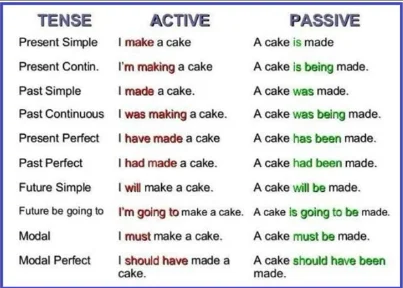
Another way to replace “I” and other personal pronouns in an essay is to use passive voice. This is achieved by transforming an active verb passive.
Though this is the case, the strategy is often difficult, and it may create sentence structures that are not acceptable in formal writing and language.
The sentences in which “I” can be successfully changed using this strategy is when an active verb describing an object is transformed into its passive form.
3. Using a Third-Person Perspective
This is a very important and applicable strategy when replacing “I” in an essay. This is where you avoid using first-person and second-person perspectives.
When referring to the subject matter, refer directly to them using the third person. For example, if you were to write, “I think regular exercise is good for mind and body”, you can replace it with “Regular exercise is good for mind and body”.
4. Use of Objective Language
Objective language is lost when a person uses informal expressions like colloquialisms, slang, contractions, and clichés. It is the reason why we discourage the use of contractions in essay writing so that you can keep things formal.
While informal language can be applicable in casual writing and speeches, it is not acceptable when writing essays. This is because you will be tempted to use a first-person perspective to convey your message.
5. Being Specific and using Strong Verbs and Adjectives
In most cases, essays that have been written using a lot of personal pronouns tend to be imprecise. When you want to avoid using “I” in your essay, try to be exact and straight to the point.
Personal pronouns tend to convey a subjective message, and it is up to the writer to explain their perspectives through writing.
Here, a writer will use a lot of “I think…” or “I believe…” to express their opinion. By doing so, the writer will end up wasting a lot of time explaining a concept.
Instead of doing that, it is best to look for appropriate verbs and adjectives to explain the points. Also, use objective language. Refer to the suggestions given by credible evidence instead of basing your arguments on what you think.
Get an essay written by a Team
Our team avoids plagiarism and ensures checks to guarantee a quality and ORIGINAL paper
Words to use Instead of Personal Pronouns like “You” and “I”
As noted, it is important to avoid using personal pronouns such as “You” and “I” when writing an essay.
By eliminating them or finding alternatives to them, your essay will be formal and objective. You can decide to eliminate them in a sentence.

For example, you could be having a sentence like “I think the author makes a valid point concerning capitalism.”
In this example, you can eliminate the personal language and write, “The author makes a valid point concerning capitalism.”
The second sentence goes straight to the point and is objective.
Other words to use instead of personal pronouns, like “You” and “I,” can be created when personal judgment words are avoided.
Instead, it is best to replace those words with those that refer to the evidence.
Examples of Ways to Replace Personal Pronouns
Below are examples of how personal judgment words can be replaced by words referring to the evidence.
- I feel – In light of the evidence
- From I think – According to the findings
- I agree – It is evident from the data that
- I am convinced – Considering the results
- You can see that – From the results, it is evident that
Using the third-person or “it” constructions can be used to replace personal pronouns like “You” and “I.” Such words also help to reduce the word count of your essay and make it short and precise.
For example, if you write “I conclude that, “replace those words with “it could be concluded that. ” Here, “it” constructions are helping replace personal pronouns to make the sentence more objective and precise.
To be more specific, words to replace personal pronouns like “I” include “one,” the viewer,” “the author,” “the reader,” “readers,” or something similar.
However, avoid overusing those words because your essay will seem stiff and awkward. For example, if you write, “I can perceive the plot’s confusion,” you can replace “I” by writing, “Readers can perceive the plot’s confusion.”
Words that can be used instead of personal pronouns like “You” include “one,” “the viewer,” reader,” “readers,” or any other similar phrases. It is similar to words that replace first-person pronouns.
For example, if you write “you can see that the poet’s tone is serious and urgent,” you can replace “You” by writing “readers/one can see that the poet’s tone is serious and urgent.”
Words to use Instead of “My” in an Essay
Since “My” demonstrates the possessiveness of something, in this case, the contents or thoughts within an essay, it makes the writing subjective. According to experts, writing should take an objective language . To do this, it is important to replace it.

You can replace the word “My” with “the”. For example, if you write, “My final thoughts concerning the issue are”, you can write, “The final thoughts concerning the issues are”.
In this case, the article “The” makes the sentence formal and objective.
Another method is eliminating the word “My” from the sentence to make it more objective and straight to the point.
In the same example above, if you write “My final thoughts concerning the issue are”, you can write “Final thoughts concerning the issue are”.
The major difference here is that the word “my” in the first example makes it subjective, and eliminating it from the sentence makes it sound formal and objective.
Final Advice
Therefore, when writing an essay, it is important to avoid personal pronouns like “You”, “I,” and “My.” Not all papers use third-person language. Different types of essays are formatted differently, a 5-paragraph essay is different from a 4-page paper , but all use third-person tones.
This is because an essay should be written in formal language, and using personal pronouns makes it appear and sound informal. Therefore, writing an essay without using ‘I’ is good.
Formal language makes your essay sound objective and precise. However, do not remove the first-person language when writing personal experiences in an essay or a paper. This is because it is acceptable and formal that way.
Order an Excellent Essay today!
Let us help you get that A in your next assignment. Place your order today, and you will enjoy the benefits.

With over 10 years in academia and academic assistance, Alicia Smart is the epitome of excellence in the writing industry. She is our managing editor and is in charge of the writing operations at Grade Bees.
Related posts

essay writing problems
10 Essay Writing Problems and their Easy Solutions
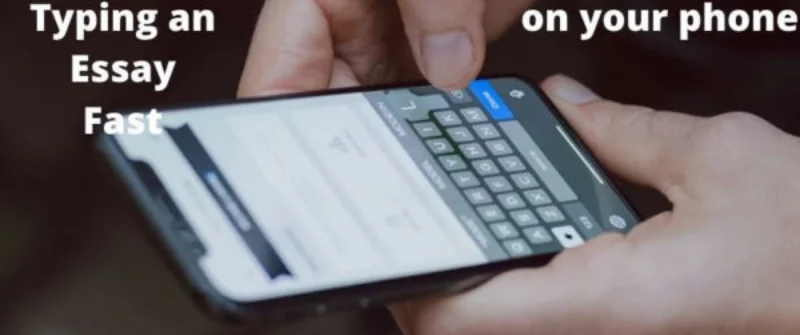
writing essay on your phone
How to Write an Essay or paper on your Phone: 3 Easy Ways
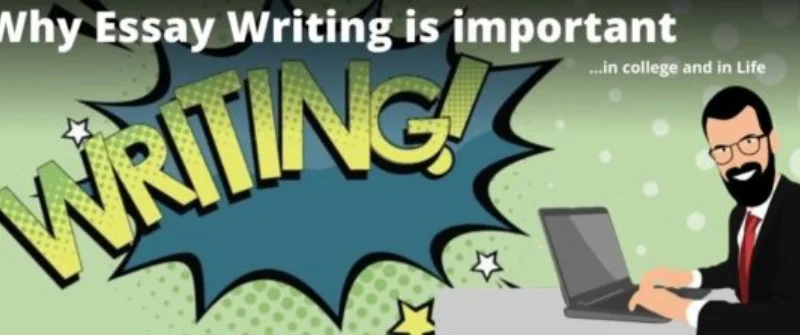
essay writing is important
7 reasons why Writing is Important in College & in Life
How to Write a Formal Essay: Format, Rules, & Example
If you’re a student, you’ve heard about a formal essay: a factual, research-based paper written in 3rd person. Most students have to produce dozens of them during their educational career.
Writing a formal essay may not be the easiest task. But fear not: our custom-writing team is here to guide you through the process. This article will:
- explain what a formal essay is;
- show how to write it step by step;
- provide you with an essay sample.
👔 Formal Essay Definition
- ✅ How to Write
- ✍️ Writing Rules
- 🖥️ Essay Format
- 📑 Sample Paper
🔍 References
A formal essay is a well-structured piece of writing with a clear introduction, body, and conclusion. This type of essay often includes cited research, uses an academic tone, and is written in 3rd person. While writing a formal essay, it’s necessary to back up your arguments with factual evidence.
What Is an Informal Essay vs. Formal Essay?
Essays come in two formats: formal and informal (also known as personal .) They differ in terms of style and context. You can choose one of the formats depending on the situation and the type of paper you need to write.
Don’t know how to tell the difference between them? Well, here are some key characteristics of these essay types:
| Characteristics | Informal essay | Formal essay |
|---|---|---|
| Usually, the purpose of an informal essay is to share opinions or to entertain the reader. | A formal essay aims to critically analyze facts, details, and ideas to prove a point. | |
| Addresses the reader directly and uses 1st-person pronouns. | Uses 3rd-person pronouns and doesn’t address the reader. | |
| Expresses the writer’s thoughts and opinions and tends to be more subjective. | Strives to be objective and uses arguments to support its ideas. | |
| Doesn’t have to be as structured as a formal essay. | Should be well-structured and logical. | |
| The thesis may be stated in any part of the work or not explicitly stated at all. | The thesis is clearly stated and located in the essay’s first paragraph. | |
| Uses everyday language, slang, 1st- and 2nd-person pronouns such as “I,” “you,” and “me.” | Uses jargon and avoids using slang and 1st- or 2nd-person pronouns. |
As you can see, these types of writing are almost total opposites. Informal essays are only reserved for creative assignments, which means that most of the papers you write need to be formal.
Our article on creative essays can help you write an informal paper. But how do you craft a perfect formal essay? Keep reading to find out.
✅ How to Write a Formal Essay
Traditionally, a formal essay it’s composed of 3 sections: an introduction, 3 or more body paragraphs, and a conclusion. Let’s examine each part in detail.
Formal Essay Introduction
The introduction is what your essay starts with. Its primary goal is to catch the reader’s attention with a hook, briefly introduce the topic, and lead toward the thesis statement located at the end of the first paragraph.
Here is what you might want to keep in mind while writing the introduction:
| ✔️ | It should be related to the topic and give the reader an overall idea of the paper. |
| ✔️ | It’s good to start your introduction with a quotation, an interesting fact, or a statistic. |
| ❌ | Try not to make the introduction too far-fetched or in-your-face. |
| ❌ | Avoid using questions in an introduction of a formal essay. |
If you want some more inspiration for your introduction, check out our article on hooks in writing .
Now on to the thesis statement : the key idea of your essay. When working on it, keep in mind that it should answer the central question in your topic and reflect your essay’s overall structure. your essay’s overall structure.
Suppose your topic is related to the teaching methods involving poetry. In that case, the thesis statement can be like this:
Teaching methods that involve reading and writing poetry in elementary school are beneficial for children as they enhance their capacity for empathy, develop creativity, and help with self-realization.
Formal Essay Body
The next part of an essay is the main body paragraphs. They support the thesis statement with well-developed arguments and explore the topic in-depth. Each body paragraph starts with a topic sentence stating its main point. The length of a paragraph can vary, but the best option is to have between 4 and 7 sentences.
To make the text flow easily, you may use transitional words. Here are some examples:
- after all,
- for instance,
- on the one/other hand,
- initially,
- as a result.
How to Write a Formal Essay Conclusion
Lastly, every essay needs closure. A good conclusion summarizes the essay’s main ideas, includes a paraphrased thesis, and encourages the readers to think more about the topic.
The structure of a conclusion may change slightly depending on the subject. For instance, it can suggest some solutions to a problem, express an opinion, or give a recommendation. It’s important to remember that the conclusion is a part that emphasizes your essay’s most important points and doesn’t introduce new information.
If you’re curious about writing each essay part, check out our article on 5-paragraph essays .
✍️ Formal Writing Rules
Just like choosing the proper attire to wear to a formal event, we need to use the right words while writing a formal essay. Here are some suggestions that can help you maintain a formal tone in your paper:
Dos of formal writing
- Pay attention to your vocabulary. The words you will use in a formal essay will likely have a nuanced meaning. Make sure you know exactly what the terms mean, and do your best to sound precise.
- Use punctuation correctly. Here are some of the things to watch out for: Avoid exclamation marks; Use dashes for insertions; Use colons with enumerations; If you’re unsure of whether to use a punctuation mark or not, rewrite the sentence in a way that doesn’t require it.
- Use varied sentence structure. In formal writing, there is always a danger of sounding monotonous. Avoid repeating sentence structures to make your essay more readable.
- Provide references. It’s essential to cite every idea that you borrow. Try to paraphrase quotations from your sources: it will help you avoid plagiarism.
Don’ts of formal writing
- Avoid using pronouns. With words such as “I,” “me,” “we,” or “us,” an essay becomes wordy. It also makes the author seem less sure of their ideas. If you want to use personal pronouns, try substituting them with words like “the reader,” “viewers,” or “one.”
- Avoid using slang expressions and nonstandard diction. Slang words in a formal essay will make it less appealing to the readers. If you want to be taken seriously, it’s best to avoid those expressions and use proper Standard English.
- Avoid informal tone. When you write a formal essay, incorporate the language and the expressions you would use while delivering a speech, not the words you use when you casually talk to friends. A formal tone suggests that the author is serious about the topic and respects the audience.
- Avoid passive voice. Passive verbs are hard to read, and they are wordy. Use active voice to sound more straightforward and concise.
Contractions in Formal Writing
A contraction is usually a combination of two words into one, such as “don’t,” “isn’t,” “can’t,” and “wouldn’t.” When you work on a formal essay, it’s essential to be careful about contractions. It’s inappropriate to use them in academic writing, so it’s best to stick to the full variant.
However, there are exceptions to this rule. For instance, when working with direct quotations, it’s essential to reproduce words exactly as they are used in the original. To learn more about it, be sure to check out the University of North Florida’s article on in-text citations .
What to Use Instead of “You” in an Essay
Another common mistake students make is using the “you” and “yours” pronouns to address the readers. This mistake can make the essay overly informal and lead to misinterpretations of the text.
How do you fix it? Our advice is to replace 2nd-person pronouns with the following words:
- individuals,
You can find more formal writing tips in this informative video from Smrt English:
🖥️ Formal Essay Format
Now that we’ve discussed formal essay writing in detail, it’s time to look at the formatting. A formal essay is usually written in MLA or APA formats. If you’re asked to write a paper in one of these formats, you may find the guidelines below helpful:
| MLA | APA | |
|---|---|---|
| Write your name, the instructor’s name, your class, and the date in the upper left corner of the 1st page. Make the title centered and place it after the heading information in the same font as the rest of your paper. | Create a separate . Make your title centered and written in boldface. Add your name, instructor’s name, school affiliation, and date. | |
| Write your last name and the number of each page in the upper right corner. | Write the number of each page in the upper right corner. | |
| Use 12-point Times New Roman font. | ||
| Make your essay double-spaced without extra spacing between the paragraphs. | ||
| Add a 1-inch margin on each side of the page. | ||
| Make the 1st line of each paragraph indented 1/5 inch. | ||
| Line up your text flush against the left margin. | ||
📑 Formal Essay Example
Here is an excellent sample of a formal essay that uses all the guidelines mentioned in this article. It will help you to produce a perfect paper of your own:
| Title | Adverse effects of sponsorship in the sports industry |
|---|---|
| Sponsorship plays a significant role in the sports industry these days. Many sports associations, football leagues, and clubs are entering partnerships with famous brands. However, it does not mean that all sponsorship has a good impact. This essay argues that a questionable sponsorship may undermine the image of a sport or a team and adversely influence the viewers. | |
| Important sports events such as FIFA or The Olympic Games are sponsored by brands such as Coca-Cola, McDonald’s, Cadbury’s, and Budweiser. These are also brands that promote unhealthy lifestyles and foods that lack nutritional value and have high levels of salt, sugar, and saturated fats. Such kind of sponsorship aims to obtain a favorable change in the attitude toward the brand itself by connecting it with sport and a healthy lifestyle. | |
| While alcohol and junk food brands link themselves to sports bodies and active lifestyles, their main targets are children and sports fans. The growing popularity of products high in saturated fat, salt, and sugar, including potato chips, sugary drinks, and confectionary, results in them being not simply a treat but a daily staple for many people. It creates various health issues, such as obesity, diabetes, and tooth decay. | |
| Finally, an association with a widely criticized brand is likely to damage the reputation of a team or even a sport itself (Crompton, 2014). People tend to expect their favorite teams to partner with fair, responsible sponsors. If the partnership is questionable, the fans may think that the sports body compromised their virtue for profit. | |
| To sum up, some kinds of sponsorship, such as alcohol or junk food, may use the sport’s image to attract more people and increase sales. It leads to the excessive consumption of sponsored products by children and teenagers and causes various health issues. It is also likely to affect the public image of a sports body. |
For more information, check out Purdue OWL’s resources on various formatting styles .
Formal Essay Topics
- Stress management techniques
- The effects of coffee
- Negative effects of technology on children
- Causes and outcomes of organizational conflicts in sports
- Different types of friends
- Same-sex marriages in the United States
- Are early marriages harmful or beneficial?
- How do nutrition and hydration improve athletes’ performance?
- Is polygamy morally acceptable?
- Different features of sports business
- What characterizes friendship in the age of media?
- Positive and negative effects of tourism on environment in the Caribbean
- How does society treat single parents?
- How does the uninvolved parenting style affect child’s future well-being?
- The role of family relationships in Odyssey
- Financial concepts in sport finance
- Main features of a strong marriage
- The importance of media coverage for sport teams
- Reasons why students choose to get internship
- The role of stadiums in the sports industry
- The multiracial family: the Carters case analysis
- Characteristics of children’s sports
- Crucial factors affecting health fitness
- How is technology used in hotel management?
- Structure and operational context of Four Seasons
- What are the main qualities of a true friend?
- Different websites that promote rental properties
- The imperative aspects of tourism
- Importance of hotel training
- What factors determine adolescents’ adjustment after they experience parental divorce?
- How does tobacco use affect the human body?
- The importance of language and world view for communication
- What makes a combination of reinforcement and punishment in parenting efficient?
- The scientific approach of sports economics
- How does divorce affect children?
- Living on-campus vs. living off-campus when attending university: a comparison
- How does the New Moves program promote a healthy lifestyle?
- How to be an effective counselor
- Various types of restaurants in Ireland
- Carolina Dog’s characteristics
- Comparison of Monzameon’s The Love Suicides at Amijima and Tartuffe by Moliere
- Comparing homosexual and heterosexual families
- How is family presented in Everyday Use by Alice Walker ?
- In what ways can Anaerobic Threshold be assessed?
- Is bad parenting a healthcare problem?
- Why student-athletes should benefit from sports
- Mind-body awareness and its health benefits
- Can punishment boost academic performance?
- Techniques to teach students swimming
- Issues faced by the sports licensing field
Thanks for reading through this guide! We hope that you found it helpful and now have a better idea of how to write an excellent formal essay. Don’t hesitate to share our article with a friend who may need it. Good luck!
Further reading:
- How to Write a Critical Thinking Essay: Examples & Outline
- What Is a Discourse Analysis Essay: Example & Guide
- How to Write a Narrative Essay Outline: Template & Examples
- How to Write a Précis: Definition, Guide, & Examples
❓ Formal Essay FAQs
It’s best not to use pronouns such as “I,” “my,” “we,” “our,” etc., in a formal essay since it give the paper an informal tone and the text becomes wordy. It also makes the writer seem less sure about their ideas.
It’s better to avoid using parentheses and dashes in formal academic writing. If the information you want to include in the essay is important enough, it should be a part of the sentence. Otherwise, you can simply omit it.
The formal and informal essays differ in style and context. While a formal essay is a piece of well-structured writing that tries to convince the reader by providing arguments, an informal essay has no set structure. It reflects the author’s personal thoughts or opinions.
Starting your sentence with “because” in formal writing is not the best idea. The word “because” is a subordinate conjunction, which means it’s used to join the main clause to a subordinate clause, not to start a sentence.
It’s best to avoid using 1st- and 2nd-person pronouns, slang expressions, nonstandard diction, and contractions in a formal essay. They are primarily used in daily speech and are considered inappropriate in academic writing.
- Point of View in Academic Writing: St. Louis Community College
- Components of a Good Essay: University of Evansville
- Introductions & Conclusions: University of Arizona Global Campus
- How to Improve Your Academic Writing: University of York
- Nine Basic Ways to Improve Your Style in Academic Writing: University of California, Berkeley
- Academic Writing Style: Organizing Your Social Sciences Research Paper: University of Southern California
- Formal and Informal Style: Northern Illinois University
- Formal Writing: Davenport University: LibGuides
- Share to Facebook
- Share to Twitter
- Share to LinkedIn
- Share to email

Rhetorical analysis is never a simple task. This essay type requires you to analyze rhetorical devices in a text and review them from different perspectives. Such an assignment can be a part of an AP Lang exam or a college home task. Either way, you will need a solid outline...

A synthesis essay requires you to work with multiple sources. You combine the information gathered from them to present a well-rounded argument on a topic. Are you looking for the ultimate guide on synthesis essay writing? You’ve come to the right place! In this guide by our custom writing team,...

A critical analysis essay is an academic paper that requires a thorough examination of theoretical concepts and ideas. It includes a comparison of facts, differentiation between evidence and argument, and identification of biases. Crafting a good paper can be a daunting experience, but it will be much easier if you...

Process analysis is an explanation of how something works or happens. Want to know more? Read the following article prepared by our custom writing specialists and learn about: So, let’s start digging deeper into this topic! ♻️ What Is Process Analysis? A process analysis describes and explains the succession of...

A visual analysis essay is an academic paper type that history and art students often deal with. It consists of a detailed description of an image or object. It can also include an interpretation or an argument that is supported by visual evidence. In this article, our custom writing experts...

Want to know how to write a reflection paper for college or school? To do that, you need to connect your personal experiences with theoretical knowledge. Usually, students are asked to reflect on a documentary, a text, or their experience. Sometimes one needs to write a paper about a lesson...

A character analysis is an examination of the personalities and actions of protagonists and antagonists that make up a story. It discusses their role in the story, evaluates their traits, and looks at their conflicts and experiences. You might need to write this assignment in school or college. Like any...
![can i use we in a formal essay Critical Writing: Examples & Brilliant Tips [2024]](https://custom-writing.org/blog/wp-content/uploads/2021/02/fingers-note-report-journalist-filling-284x153.jpg)
Any critique is nothing more than critical analysis, and the word “analysis” does not have a negative meaning. Critical writing relies on objective evaluations of or a response to an author’s creation. As such, they can be either positive or negative, as the work deserves. To write a critique, you...

If you are assigned to write a rhetorical analysis essay, you have one significant advantage. You can choose a text from an almost infinite number of resources. The most important thing is that you analyze the statement addressed to an audience. The task of a rhetorical analysis essay is to...

Any literary analysis is a challenging task since literature includes many elements that can be interpreted differently. However, a stylistic analysis of all the figurative language the poets use may seem even harder. You may never realize what the author actually meant and how to comment on it! While analyzing...

As a student, you may be asked to write a book review. Unlike an argumentative essay, a book review is an opportunity to convey the central theme of a story while offering a new perspective on the author’s ideas. Knowing how to create a well-organized and coherent review, however, is...

The difference between an argumentative and persuasive essay isn’t always clear. If you’re struggling with either style for your next assignment, don’t worry. The following will clarify everything you need to know so you can write with confidence. First, we define the primary objectives of argumentative vs. persuasive writing. We...
- The Open University
- Accessibility hub
- Guest user / Sign out
- Study with The Open University
My OpenLearn Profile
Personalise your OpenLearn profile, save your favourite content and get recognition for your learning
Can I use 'we' and 'I' in my essay? Introducing corpus linguistics
This page was published over 6 years ago. Please be aware that due to the passage of time, the information provided on this page may be out of date or otherwise inaccurate, and any views or opinions expressed may no longer be relevant. Some technical elements such as audio-visual and interactive media may no longer work. For more detail, see how we deal with older content .

What is a corpus?
But what exactly is meant by a corpus? A corpus (plural corpora) is basically a collection of texts, selected and organised in a principled way, and stored on a computer so that you can search easily. It could be anything from a few hundred words (e.g. a collection of your Facebook status updates) or several billion words (e.g. corpora compiled from trawling webpages).
You can search corpora that already exist, using a 'concordancer' or other types of software, or you could even build your own corpus if you want to investigate a particular type of text and you can't find an existing corpus.
Googlefight
We're all now used to searching large collections of texts quickly. Every time you use a search engine you're effectively trawling through vast numbers of entries.
So why don't linguists just use Google as a large corpus to find out how language works? Searching the web works as a very rough and ready way of quickly getting a sense of how language items are used.
You might be interested in trying a 'Google fight' to resolve disputes over how frequently two words or phrases are used! Go to www.googlefight.com . Here's what I found when I searched for 'we' and 'I':
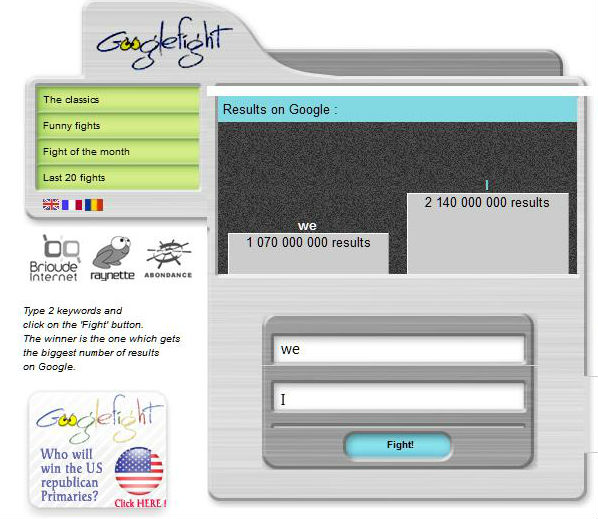
So 'I' wins the Googlefight. But what does this actually mean?
If you search the web using Google or another search engine, your search will include all sorts of webpages – and duplicates of webpages. You also don't have any idea about the kinds of text the word appears in or about the other words your search item is used with (the 'co-text').
If we want to know whether 'we' is more common than 'I' in student essays, for example, looking on Google wouldn't be a very good way to go about it. And if we wanted to know if one group of students (for example Engineering students) use 'we' in their academic writing more than another group (such as History students) then an internet search wouldn't be any help at all.
To answer the question in the title to this article, we'd get a more accurate result by searching a collection of student writing such as the British Academic Written English or 'BAWE' corpus (pronounced 'boar' like the animal).
This corpus contains not just essays but also lab reports, case studies, literature reviews, and other types of writing that undergraduate and masters students do at university. Here I've used the free site Sketch Engine Open and I've searched the whole BAWE corpus:
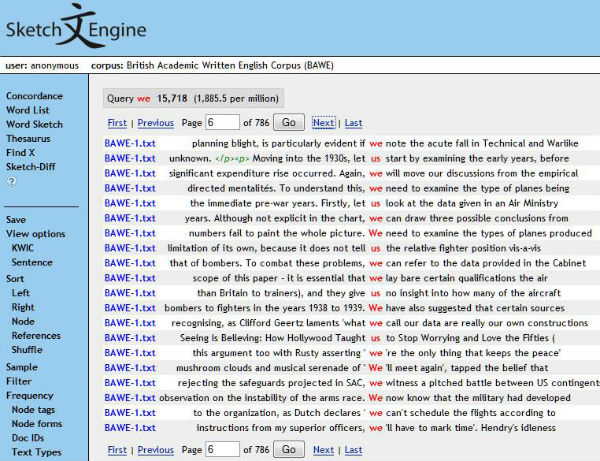
From this screenshot, we can see that BAWE contains 15,718 instances of 'we' (or 1,885 per million words). A similar search for 'I' reveals that there are 13,069 instances in the whole student corpus (or 1,568 per million words).
So in the BAWE corpus, 'we' is more frequent than 'I'; this is the opposite result to Googlefight. Searching a corpus of student writing gives us results from this type of text and not from all texts found on the web.
A concordancer (unlike Googlefight) also shows us the co-text, that is, the words appearing before and after our search term (in this case 'we'). Another piece of software that shows us the co-text to 'I' and 'we' is the 'Wordtree'. Below you can see a search for words occurring after 'we'. You can access the Wordtree online .
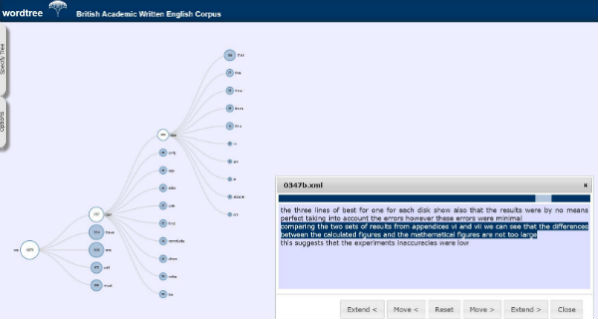
So, is 'we' or 'I' more common in essay-writing? The answer overall from our search of the BAWE corpus is that 'we' is more common. But to give a more useful and accurate answer, you might want to also look at particular disciplines such as English Literature or Biological Sciences.
And you might also want to consider whether you're writing an 'essay' or a 'literature review' or a 'lab report'.
But in overall student writing 'we' takes first place!
Follow-on links
Using sketch engine to explore the bawe corpus.
The free version of Sketch Engine gives access to several corpora, including BAWE. From the homepage of Sketch Engine, choose a corpus, then click ‘concordance’ and type a word or phrase in the text box. This will produce a list of concordance lines which can then be sorted. The ‘help’ function gives very clear guidance for more advanced searches.
Reading more about BAWE
You can find out more about the British Academic Written English corpus (BAWE) from the BAWE website .
Corpus linguistics resources
For useful links, look at this site . Click on ‘CBL Links’ for information on corpora, software and courses.
You could also look for free, short courses on Futurelearn, such as The University of Lancaster's Corpus Linguistics
And from The Open University...
- You might like The Open University course Exploring English Grammar
- Try a free sample of English Grammar In Context on OpenLearn
- If you're a bit more advanced, consider the postgraduate course Language, literacy and learning in the contemporary world - there's an OpenLearn course sample on learning a second language
Become an OU student
Ratings & comments, share this free course, copyright information, publication details.
- Originally published: Monday, 20 January 2014
- Body text - Creative Commons BY-NC-SA 4.0 : The Open University
- Image 'Should this be I or should this be we?' - Emanuele Rosso under CC-BY-NC-ND licence under Creative-Commons license
- Image 'A screengrab comparing the number of returns for I against We on Google' - Copyright: Googlefight
- Image 'Screengrab showing instances of the word 'we' in the British Academic Written English corpus as returned by SketchEngine' - Copyright: Sketchengine
- Image 'A screengrab from Wordtree showing the words which follow we' - Copyright: Wordtree
Rate and Review
Rate this article, review this article.
Log into OpenLearn to leave reviews and join in the conversation.
Article reviews
For further information, take a look at our frequently asked questions which may give you the support you need.
Definition and Examples of Formal Essays
Glossary of Grammatical and Rhetorical Terms
- An Introduction to Punctuation
- Ph.D., Rhetoric and English, University of Georgia
- M.A., Modern English and American Literature, University of Leicester
- B.A., English, State University of New York
In composition studies , a formal essay is a short, relatively impersonal composition in prose . Also known as an impersonal essay or a Baconian essay (after the writings of England's first major essayist , Francis Bacon ).
In contrast to the familiar or personal essay , the formal essay is typically used for the discussion of ideas. Its rhetorical purpose is generally to inform or persuade.
"The technique of the formal essay," says William Harmon, "is now practically identical with that of all factual or theoretical prose in which literary effect is secondary" ( A Handbook to Literature , 2011).
Examples and Observations
- "' Formal' essays were introduced in England by [Francis] Bacon , who adopted Montaigne's term. Here the style is objective, compressed, aphoristic , wholly serious. . . . In modern times, the formal essay has become more diversified in subject matter, style , and length until it is better known by such names as article , dissertation, or thesis, and factual presentation rather than style or literary effect has become the basic aim." (L. H. Hornstein, G. D. Percy, and C. S. Brown, The Reader's Companion to World Literature , 2nd ed. Signet, 2002)
- A Blurred Distinction Between Formal Essays and Informal Essays "Francis Bacon and his followers had a more impersonal, magisterial, law-giving, and didactic manner than the skeptical Montaigne. But they should not be viewed as opposites; the distinction between formal and informal essay can be overdone, and most great essayists have crossed the line frequently. The difference is one of degree. [William] Hazlitt was essentially a personal essayist , though he wrote theater and art criticism; Matthew Arnold and John Ruskin were essentially formal essayists , though they may have tried a personal essay once in a while. Personality creeps into the most impersonal of writers: it is difficult to read Bacon on friendship or having children , for instance, without suspecting he is talking about autobiographical matters. Dr. Johnson was probably more a moral essayist than a personal one, though his work has such an individual, idiosyncratic stamp that I have persuaded myself to place him in the personal camp. George Orwell seems split fifty-fifty, an essay hermaphrodite who always kept one eye on the subjective and one on the political. . . . "The Victorian era saw a turn toward the formal essay , the so-called essay of ideas written by [Thomas] Carlyle, Ruskin, [Matthew] Arnold, Macaulay, Pater. Between Lamb and Beerbohm there was scarcely an English personal essay, with the exception of those by Robert Louis Stevenson and Thomas De Quincey . . . ." (Phillip Lopate, Introduction to The Art of the Personal Essay . Anchor, 1994)
- Voice in the Impersonal Essay "[E]ven when 'I' plays no part in the language of an essay, a firm sense of personality can warm the voice of the impersonal essay narrator . When we read Dr. [Samuel] Johnson and Edmund Wilson and Lionel Trilling , for instance, we feel that we know them as fully developed characters in their own essays, regardless of their not referring personally to themselves." (Phillip Lopate, "Writing Personal Essays: On the Necessity of Turning Oneself Into a Character." Writing Creative Nonfiction , ed. by Carolyn Forché and Philip Gerard. Writer's Digest Books, 2001)
- Crafting the Impersonal "I" "Unlike the exploratory 'self' of Montaigne, Francis Bacon's impersonal 'I' appears already to have arrived. Even in the comparatively expansive third edition of the Essays , Bacon provides few explicit hints as to either the character of the textual voice or the role of the expected reader. . . . [T]he absence of a felt 'self' on the page is a deliberate rhetorical effect: the effort to efface voice in the 'impersonal' essay is a way of evoking a distant but authoritative persona . . . . In the formal essay , invisibility must be forged." (Richard Nordquist, "Voices of the Modern Essay." University of Georgia, 1991)
- "Of Studies" by Francis Bacon
- Characteristics of a Formal Prose Style
- A Brief History of English Literature
- What Does "Persona" Mean?
- An Introduction to Literary Nonfiction
- A Look at the Roles Characters Play in Literature
- Mark Twain's Colloquial Prose Style
- Using Informal Style in Prose Writing
- What Are the Different Types and Characteristics of Essays?
- What is a Familiar Essay in Composition?
- Definition of Belles-Lettres in English Grammer
- Francis Bacon: "Of Parents and Children"
- Purple Prose
- Levels of Usage: Definition and Examples
- The Essay: History and Definition
- Vernacular (Language)
Stack Exchange Network
Stack Exchange network consists of 183 Q&A communities including Stack Overflow , the largest, most trusted online community for developers to learn, share their knowledge, and build their careers.
Q&A for work
Connect and share knowledge within a single location that is structured and easy to search.
Can I use "I" in an essay?
Why is it unprofessional to use the first person in a formal essay?
I was writing an argumentative paper for my Language Arts AP class, and I got docked points for having "I" in there.
Can you please help me wrap my head around this logic?
- academic-writing
- conventions
- It's not necessarily unprofessional, it's simply uncommon. If you got docked points for using the pronoun, but the rules of marking had not been explained beforehand, then you have a legitimate complaint. (Not that you'll likely win any such argument . . .) – Jason Bassford Commented May 9, 2018 at 5:46
- Arguably, I could write a formal essay that starts with, "When I was young, I remember . . . but today, its use is less common." In such a context, my use of the pronoun seems reasonable to me—because it's only my memory that I can be speaking about with authority. (I could replace I with my name or this author but both of those constructs seem even more awkward to me.) I think the point is, traditionally, not to use I casually. – Jason Bassford Commented May 9, 2018 at 5:52
- @JasonBassford I think your statement is misleading. The actual case is that the rules have changed. At one time, use of the explicit first person was absolutely (if unofficially) forbidden in formal writing. Since then, the unwritten rules have greatly relaxed. – Chris Sunami Commented May 9, 2018 at 13:31
- @ChrisSunami I was only talking about the current rules. I'm assuming that essays aren't still being written in the past. :) – Jason Bassford Commented May 9, 2018 at 16:23
- @JasonBassford Touché – Chris Sunami Commented May 9, 2018 at 16:36
4 Answers 4
It's often seen as too casual.
Consider the following phrase:
As I stated earlier, Romeo & Juliet is a tragedy.
The use of "I" in this statement implies that the author has a connection to the reader and that it's fairly casual. That's not always the case. If you were writing that on your AP Language test, the test taker isn't anybody who has met you.
Removing it takes away that implied personal connection.
As stated earlier, Romeo & Juliet is a tragedy.
It implies credibility that may not exist
The following statements have a different "feel" to them.
My name is William Shakespeare, author of the play. As I stated earlier, Romeo & Juliet is a tragedy. My name is Michael Sexton, Director of the Public Shakespeare Initiative. As I stated earlier, Romeo & Juliet is a tragedy. My name is Jay, an English student. As I stated earlier, Romeo & Juliet is a tragedy.
If the first two people wrote your essay, they could probably get away with using "I" because they have the credibility to back it up. But you as an English student don't (yet). Removing "I" statements means the focus is no longer on yourself and your thoughts, but rather on the arguments to back it up.
Use of "I" often a symptom of underlying grammatical or presentational problems
Using the word "I" in and of itself can be very effective, but at the high school level, it's often indicative of other problems.
Using a weak statement instead of an authoritative one
I conclude that Romeo and Juliet is a tragic story.
This is a weak statement. You might imagine it being followed with "but I could be wrong". Removing that phrase is more authoritative.
Romeo and Juliet is a tragic story.
Stating your opinion, rather than relying on sources
If you find yourself using the word "I", it might mean that you are relying on your own research instead of that of others.
I conclude Romeo and Juliet is a tragic story.
If you were William Shakespeare, that would be enough because of your credibility. But you aren't, meaning that this is just your unsourced opinion. The following phrase is better.
Dozens of literary critics have concluded that Romeo and Juliet as a tragic story. [citation]
Injecting feelings or subjectivity into intellectual, objective arguments
A lot of high schoolers use "I" in conjunction with feeling phrases.
I believe that Romeo and Juliet is a tragic story. I think that Romeo and Juliet is a tragic story. I would argue that Romeo and Juliet is a tragic story.
All of these are problematic because they rely on emotions and opinions, rather than facts, and they lack authority for that reason.
Turning an objective statement into a subjective one
As parodied by the webcomic XKCD , sometimes things are objectively true.
The Gateway Arch is the most recognizable arch in St. Louis.
Using an "I" statement can weaken that and make it subjective.
I believe that the Gateway Arch is the most recognizable arch in St. Louis.
If Romeo & Juliet meets the criteria of a tragedy, just say it. Chances are that "I" statements like "I conclude that..." are going to weaken that argument and make it seem more subjective.
Granted, there are times where a statement should be subjective, but they are rarer in formal essays and there are other ways to express that without using the word "I".
Finally, it doesn't match with conventions used in many types of writing
The answer may boil down to "because other people don't do it."
Do your textbooks use the first person when describing concepts? Do newspaper articles (aside from opinion pieces) do it? Part of writing is following the conventions of the type you are using, because that's what the user expects. As you may have noticed, Stack Exchange has conventions too, like not saying "Thanks! -Jay" at the end of your questions.
Part of the conventions of analytical academic writing is that the first person is rarely used. For instance, this article from the Journal of Palestine Studies examines media portrayal of Israelis and Palestinians in modern culture. Not once in the entire article does it use "I" or "we". This is typical in the vast majority of academic articles I've read.
Those who say that you should stop using "I" because your teacher says so are probably alluding to this reason. The convention your teacher has established in his or her class is that formal essays do not use the word "I". Hopefully, those conventions aren't arbitrary and are reflective of real-world usage, but regardless, that's the convention established. Going against it can be jarring to what your readers expect.
- RE make it subjective: True that use of "I" can make it subjective. But sometimes this is correct. "In my opinion, the atomic number of Helium is 2" adds an unnecessary and inaccurate subjective, implying that the atomic number of Helium is a matter of opinion and not an objective fact. But on the flip side, baldly stating, "There is intelligent life on other planets" implies that this is a proven fact and not a debatable conjecture. These cases are probably trivial because most people know that the first is a fact and the second an opinion. But a statement one way or the other could be ... – Jay Commented May 9, 2018 at 5:16
- ... misleading on less well-known statements. Like is I wrote an article describing some new scientific theory, and I said, "the Miller-Crawford Theory is the best explanation of the structure of the nucleus yet proposed" (I just made up that name, not a real theory), a reader might understand that to mean that this is a proven fact or at least a broad consensus of scientists, when perhaps I am expressing my opinion about a question that scientists in the field consider controversial. – Jay Commented May 9, 2018 at 5:19
- @Jay Fair point that removing "I" can make something seem more settled and proven than it actually is. Do you have any recommendations on how I could improve this answer? (Feel free to edit it yourself if you'd like). – Thunderforge Commented May 9, 2018 at 14:49
- 1 I wouldn't dream of editing someone else's answer besides fixing an obvious spelling mistake or such. I think pretty much everything you said was true, I'd just add that there is a flip side: sometimes we WANT to make an assertion weak or subjective, etc. – Jay Commented May 9, 2018 at 17:17
There's nothing inherently wrong with using the word "I" in an essay.
I haven't read your essay, so it may be that it was inappropriate in that particular essay.
But a general rule of life that I follow: If the teacher or my boss or someone in authority says to do X if I want to get a good grade or a pay raise or whatever, then I do X, whether I think it's a good idea or not. Unless it's some profound moral issue. You're not going to win by arguing about it. When you turn in a paper to this teacher, follow the teacher's rules. When you graduate the class, you can decide which rules make sense and you want to follow in general, and which don't.
- I understand where you're coming from, but I'm still young and don't quite understand fully the purpose of excluding certain words or subjects in academic writing. – Aspen the Artist and Author Commented May 8, 2018 at 20:44
- My essay was about popular culture, and their views on the Greek God Hades. – Aspen the Artist and Author Commented May 8, 2018 at 20:44
- There are many reasons why personal pronouns might be frowned upon. Take a look at this (example) guide to the use of personal pronouns for some enlightenment. But in reality, only your teacher can answer this specific question in proper context. One could guess and say that perhaps she wanted you to maintain an air of scientific impartiality . Too much "I found this" and "I think that" might lead one to conclude that your opinions and perceptions are clouding any useful data & conclusions! – elemtilas Commented May 8, 2018 at 21:40
- @elemtilas Yes, the article you cited is a good one. In retrospect, perhaps my answer should have included some discussion of when personal pronouns are appropriate in an essay and when not. – Jay Commented May 9, 2018 at 5:03
- This is basically the answer I would have given. Lots of people use "I" in a professional level essay. But if your teacher doesn't want you to, then you don't. Simple as that. It's also good practice to learn how to write an essay without using first person. You can also ask your teacher if you can rewrite it to remove the first person for extra credit (some teachers will say yes). – Cyn Commented Nov 14, 2018 at 15:18
I personally enjoy using personal pronouns in my essays, but only when they actually help me get my point across– for instance citing personal experiences as anecdotal evidence– or if I'm using them in my hook. They can bring a sense of informality/candor into the paper that can be both beneficial (deviates from the stark, run-of-the-mill essay norms and creates connection with audience) or detrimental (adopts a haphazardly casual tone that runs away with the author's arguments) depending on when and how they're used. As long as you know what you're doing, you should be fine.
I forgot to add; of course, if your instructor wants you to write in a certain style, definitely listen to him or her so you don't get points docked off . If it's an essay you're writing for fun or for a publication that has looser rules, then go for it!
You may refer to yourself (using "I") in a formal essay if you report something that you have objectively done, such as conducted an experiment:
I have measured the body height of 3,456 randomly chosen US women and found that on average they were ...
Current academic style (MLA, APA) requires that you clearly indicate who did what and demands that you use "I" if it was you who did it! Do not ever cloak yourself in plural ("We measured ...", when you were alone) or indirect phrases ("3,456 women have been measured ...").
You must not give your personal opinion in an argumentative paper. An argumentative paper is an exercise in logic, where one argument is played out against another. These arguments are not your opinion , but views that any person might have. Your task is to take on a neutral, unbiased perspective and find the more plausible argument.
If you are given the task to argue for a certain view, you still must pretend that you write from a neutral and unbiased viewpoint, even if you don't. It is a style .
Not the answer you're looking for? Browse other questions tagged style academic-writing essay conventions or ask your own question .
- Featured on Meta
- Announcing a change to the data-dump process
- Upcoming initiatives on Stack Overflow and across the Stack Exchange network...
Hot Network Questions
- Why does obj.data not get updated
- Do I have legal grounds?
- How to deal with unmovable files like MFT when trying to shrink a partition?
- Terminology: A "corollary" to a proof?
- Using verb and verbatim in tabular or tabularray
- Is it possible to spend unconfirmed UTXO?
- NSF grant: entire budget is just 1 person's salary
- Looking for a book I read pre-1990. Possibly called "The Wells of Yutan". A group of people go on a journey up a river
- Get GNU tar PID inside of --to-command
- Why is much harder to encrypt emails, compared to web pages?
- Confusion about Mathematical Induction
- What are the not-winglet wingtips on the CL-415?
- Does an ocean or sea count as Running Water against a vampire?
- Why try to explain the unexplainable?
- Camera on me and my computer screen all day
- Help troubleshooting inconsistent pH measurements
- What is a Primordial binary?
- Minerals in asteroids that can only be detected indirectly
- Can I use "one" and "they/them/their" in the same sentence?
- Report a police emergency at home while abroad
- Finding the nearest point with QGIS Field Calculator
- Can a superhero story work in novel format?
- What do the H and the E stand for in John Cohn's name?
- Can someone legally go out in public with only their underwear on?
A business journal from the Wharton School of the University of Pennsylvania
Knowledge at Wharton Podcast
What does your writing style say about you, july 23, 2024 • 15 min listen.
Wharton’s Jonah Berger explains how writing style can predict future success.

Listen to the podcast.
Wharton marketing professor Jonah Berger discusses his published study, “ Topography of Thought ,” which was co-authored with Olivier Toubia , business professor at Columbia Business School. The paper examines how someone’s writing style can be indicative of their future success, and where generative AI might come into the picture.
Read an edited transcript below.
Studying How Successful People Think
Angie Basiouny: Give us an overview of this paper by way of explaining your title. What is topography of thought?
Jonah Berger: I don’t have to tell you that we all use language all the time. We write emails, make presentations, and submit job applications. We use language all the time. And language, in some sense, is a fingerprint. It reveals or reflects things about the people who produce it. You can predict how extraverted someone is, for example, based on the words they use.
But beyond the individual words people use, might the pattern of ideas they put out there, the way they organize their ideas, reveal something interesting about them and their likelihood of future success?”
I think it’s important to talk about what I mean about the pattern of ideas. When someone talks about something, they can cover a small amount of ground or a large amount of ground. If you ask someone about their work history, for example, they can talk about a variety of things they’ve done or a smaller set of things they’ve done. They can cover a lot of ground or a little bit of ground.
If you want to use an analogy here, you can almost think about going for a run. Someone can go for a run and go all the way around the city, or they can go for the same number of miles, but just go around the block a number of times. In both cases, they did the same distance, but they covered more ground in one than the other. So, one way we express ideas is the amount of ground we cover. We cover more ground with our ideas, or less. We can talk about more ideas, more topics, more themes, more things that are disparate from one another, or things that are related to one another.
But it’s not just that. It’s also the speed with which we move between adjoining ideas. Imagine a movie. It can cover more or less ground across the course of the movie, but it can also move faster or slower between ideas. If a movie has one scene, for example, that’s at the beginning of a wedding, if the next scene is the later part in a wedding, that’s related to the first part. Different things may happen, but it’s pretty closely related. But if you jump from a wedding to an action scene, that would be really different sorts of ideas. They’re not very related. They’re moving further across those two points.
We wondered if these two ideas, how much ground someone covers, and how quickly they move between ideas, might tell us something about their likelihood of future success.
Basiouny: You’re not talking about the length of the piece of writing. You’re not talking about whether it’s a 500-word essay or 1,000-word essay. It’s really about how they use that space to move through their ideas. Correct?
Berger: Yes, great point. It’s not about the length. It’s about the ground covered. Are they covering a lot of ground in their hundred or thousand words, whatever it is? Or are they covering less ground? Someone talking about their vacation could share 1,000 words, but they could use those words to talk just about the food they ate, or also to talk about the sights they saw and the places they visited. The former would cover less ground while the latter would cover more.
Basiouny: How did you go about studying this?
Berger: The same ideas can be applied to any type of content, but here we looked at college applications. In other work we’ve looked at online reviews, and in related work we looked at books, movies, and TV shows.
We took 40,000 college application essays from a variety of folks who were applying to school, and we looked at what they wrote and the topography of thought of what they wrote — how much ground they covered in that essay. Again, similar length, but how much ground they covered, and how quickly they moved between ideas. And we looked at their future success. How well did they do in school? What was their GPA once they got there? We were interested in seeing whether, not just the individual words they use, but the way they express ideas might that reveal something or predict how likely they are to be successful in the future.
The Essay Writing Style That’s Linked to Greater Success
Basiouny: What did you find?
Berger: We found two very important things. First, covering more ground, that notion of covering a broad range of things in the same amount of length, was linked to greater success. But doing so while moving rather slowly, was also important.
Think about the numbers arrayed on a circular clock. You could cover a lot of ground by moving in a circle, (e.g., going from 12 to 1 to 2 to 3 to 4) or by traversing the same ground but going from like 12 to 6 to 1 to 7 to 3 to 11. You’ve covered the same amount of ground, but you’ve taken a much longer route between each individual point.
What we found is that folks who are successful in school are able to blend these two things that might seem mutually exclusive. It might seem like covering a lot of ground requires moving really quickly between points to get there. But folks that end up doing well in school figure out a way to cover that ground really efficiently. They’re able to do so by moving slowly between these points, and they don’t have to take a lot of big jumps along the way.
Basiouny: In this paper, you controlled for some socioeconomic factors. Can you talk about that a little bit?
Berger: Yes, so someone could wonder, “OK, so you’ve found that people did well in school, and you’re using writing as a way to indicate how they think. But does it indicate something else?” Maybe it’s just that people who do better on the SAT also have higher grades and also tend to write a certain way. Maybe it’s that people who have parents who are more educated tend to write a certain way and also do better in school. Or maybe people who have parents who are more educated can afford to pay for an essay consultant who helps them write a certain way and also helps them do better in school.
So, we controlled for a variety of different things. We controlled for what they wrote about. Maybe certain types of people tend to write about certain types of things, rather than other types of things. Maybe it’s not about how they write, it’s about what they wrote about — the topics or themes they discussed. No, it wasn’t that.
Maybe it’s parents’ education. No, we controlled for that. Maybe it’s SAT scores. No, we can control for that. What this suggests is that the topography of thought goes beyond things related to just socioeconomic factors or family background. It’s not just that people who might have had wealthier families, for example, tend to write a certain way or have application consultants and do better in school because they get tutoring. No, it really suggests that writing reveals something about the way we think, which can reveal or predict our likelihood of being successful in the future.
Implications Beyond College Essay Writing
Basiouny: There are other critical forms of writing that we do every day in business, like cover letters, resumes, a press release, communications to the C-suite. Can you take this research and translate it into a business context?
Berger: What I find fascinating about these ideas is yes, we looked at the case of college application essays, but it doesn’t have to be only about application essays. These same ideas should apply more broadly to a variety of contexts, whether it’s a cover letter that someone writes, whether it’s an online review that someone puts together, whether it’s the emails they write at the office — all these things provide insight into who people are and what they’re likely to do in the future. I think on a previous episode that you had me on, I talked about a paper I loved recently, where they can tell whether someone is going to default on the loan or not by the language they use in their application. Similarly, you can predict whether someone is going to get promoted or fired or leave a job for a better opportunity elsewhere based on the language they use in their email.
Most of this work that I just mentioned is using individual words, but I think what our work suggests beyond the individual words someone used, you can get insight into who they are, how they think, and how well they’re going to do in the future, based on the pattern of ideas that they have or their topography of thought.
Basiouny: As a manager, it gives you an indication of how they might move through their physical work or their knowledge work, right?
Berger: Yes, one thing we’re looking at right now is, as people learn more, does that change the way their topography of thought looks? Obviously, as we gain more knowledge in a given domain, we may talk differently. We may think about ideas differently. One thought we have is, “Hey, if people who are able to cover a lot of ground really efficiently by moving slowly between points, how did they get there? Are they naturally that way?” Probably not. They may have gained more knowledge along the way that allows them to represent their ideas differently.
One thing we’re doing right now is looking at online forums where people write multiple reviews over time. Someone, for example, might write hundreds of wine reviews over the years. They’ve learned more about wine years later. We’re looking at how do they represent ideas differently as they gain knowledge? And that may help us understand why people who represent ideas certain ways end up doing better.
Humans Still Write Better than ChatGPT and Gen AI — For Now
Basiouny: ChatGPT and artificial intelligence have entered the conversation. People have access to these free tools that can help them perfect their cover letters and written business communication. How does this change things? We can’t really tell how good someone’s topography of thought is if they have an AI-assisted piece of writing. What do we do?
Berger: Yes, so I’d say a couple of things. I agree with much of what you said, except one word. I’m not sure they allow you to “perfect” your writing. At least at the moment. What they do is allow you to write something pretty good quickly and easily. You give it a prompt, and it produces content that’s pretty interesting, does a pretty good job of doing something that might have been difficult for you to do.
And to a degree it uses your own content somehow. Like you could say, “Take my CV and use it to put together a cover letter based on my past experiences.” So that is based on you, and someone else’s might look different, to the degree that their CV is different, but I wouldn’t say it necessarily perfects anything. At least at the moment.
Certainly, tools like ChatGPT and others have made the production of content much easier, and I can imagine a time down the road where we do use them for many tasks, rather than writing ourselves. But I still think there is a lot to be understood about how language reflects the people that produce it and how to write more effective content, based on understanding what makes language impactful.
More From Knowledge at Wharton

Vera Bradley CEO: Company Rebrands Need to Reset the Brand Health

Ciara Dilley, VP of Marketing for Global Brands at PepsiCo

Marketplace Dignity: The Hidden Driver of Customer Engagement
Looking for more insights.
Sign up to stay informed about our latest article releases.
Carey Business School blog
- Request Info
Jul 17, 2024
Admissions tips: How to write a graduate admissions essay
An admissions essay is a standard part of the admissions application. To help, we’ve curated our top tips on how to write a standout graduate admissions essay.

- Share via Email
Everyone has a unique narrative, and we firmly believe that your qualifications go beyond what can be captured on your resume. But the question is, how will you distinguish yourself from the competition when applying to Johns Hopkins Carey Business School?
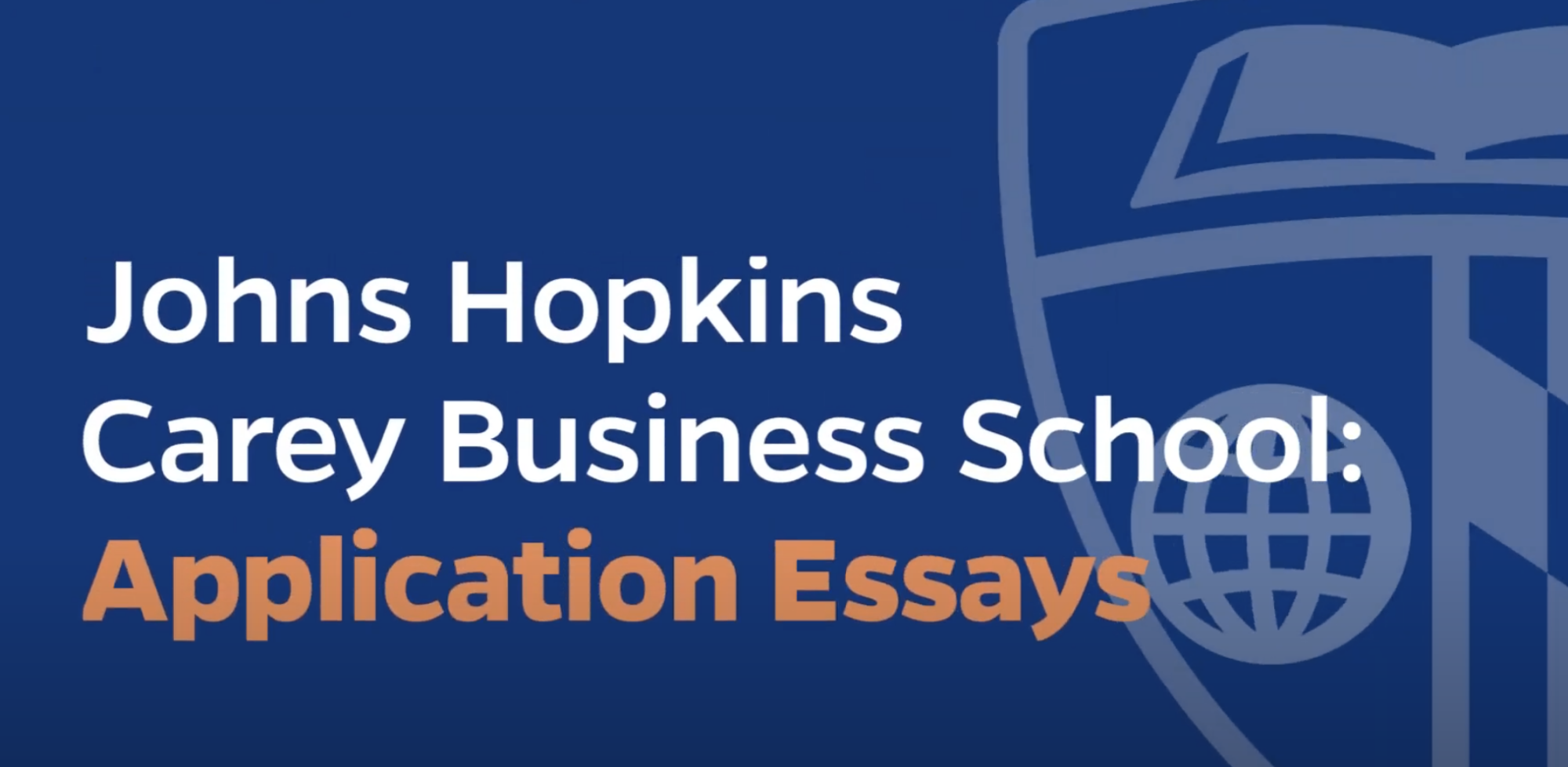
What to consider when writing a graduate school application essay The essay portion of the application is your opportunity to broaden our admissions team’s understanding of your abilities beyond what they can see on your transcript and resume. Writing an essay is your chance to share your unique strengths, personal history, journey of growth, and any additional qualities that show you are a strong candidate.
Preparing to write your essay Prior to starting your essay, read all prompts carefully. Take a moment to reflect on your reasons for pursuing a graduate business degree. It may be beneficial to have a pen and notepad at your disposal for this reflective exercise. Think about your personal journey and pinpoint pivotal moments in your growth and learning, then take note of how those moments have shaped you and your experiences, and how they could help guide you through your business school journey. Be sure to also use the correct formatting and avoid adding lists and bullet points to your essays.
Outline your thoughts Once you have a solid understanding of how to convey your personal journey within the context of the essay prompts, the next step is to construct an outline. As you shape the direction and flow of your essay, always keep your audience in mind. Our admissions team reviews thousands of application essays, so it’s crucial to find a creative hook that will make your story stand out.
Don’t overthink As you begin to write your first draft, allow your ideas to flow freely. Don’t fixate on grammar or finding the perfect words at this stage–simply capture your thoughts on paper. You can refine your essay in the second draft.
Step away After finishing your first draft, set it aside for a day or two before returning to edit it. Revisiting your work with a fresh outlook allows for a new perspective. During this second review, tackle the details of grammar, punctuation, and vocabulary. You might find it helpful to read your essay in reverse order to catch any typos.
Ask for feedback Once you feel your essay is in good shape, it’s highly recommended that you share your draft with an advisor, professor, trusted colleague, friend, or even your recommender. Gaining insights from a trustworthy source can enhance the quality of your essay and assist in identifying any typos or minor adjustments. While editing is an important step, it should not cut out your authentic voice and tone. When identifying a proofreader, make sure to find someone who knows your authentic voice and tone and can edit your paper while still preserving your natural voice and tone.
Finalize and submit You’re almost done! Before finalizing your essay submission, do one last review. Run a spell check and read your essay out loud to yourself. This approach can help you pinpoint areas that might require clarification or fine-tuning. As you review your final draft, be sure that you thoroughly addressed the question on the application.
Keep in mind that the essay portion of the application is your chance to set yourself apart Admissions team members want to hear your authentic voice, with a style that sounds natural and genuine. By sharing your authentic self, and your transformative experiences, passions, goals, and voice, you can leave a lasting impression.
Best of luck with the rest of your application journey!
Upcoming Carey application deadlines
The Fall 2025 Full-time MBA application is now open. Applications for all other Fall 2025 programs will open this fall. Please visit our upcoming deadlines webpage to view all application, decision, and deposit deadlines.
Full-time MBA Fall 2025: Early action application deadline
September 11, 2024
Part-time programs Spring 2025: Round 1 application deadline
October 9, 2024
Full-time MBA Fall 2025: Round 1 application deadline
October 23, 2024
Suggestions or feedback?
MIT News | Massachusetts Institute of Technology
- Machine learning
- Sustainability
- Black holes
- Classes and programs
Departments
- Aeronautics and Astronautics
- Brain and Cognitive Sciences
- Architecture
- Political Science
- Mechanical Engineering
Centers, Labs, & Programs
- Abdul Latif Jameel Poverty Action Lab (J-PAL)
- Picower Institute for Learning and Memory
- Lincoln Laboratory
- School of Architecture + Planning
- School of Engineering
- School of Humanities, Arts, and Social Sciences
- Sloan School of Management
- School of Science
- MIT Schwarzman College of Computing
Large language models don’t behave like people, even though we may expect them to
Press contact :, media download.

*Terms of Use:
Images for download on the MIT News office website are made available to non-commercial entities, press and the general public under a Creative Commons Attribution Non-Commercial No Derivatives license . You may not alter the images provided, other than to crop them to size. A credit line must be used when reproducing images; if one is not provided below, credit the images to "MIT."

Previous image Next image
One thing that makes large language models (LLMs) so powerful is the diversity of tasks to which they can be applied. The same machine-learning model that can help a graduate student draft an email could also aid a clinician in diagnosing cancer.
However, the wide applicability of these models also makes them challenging to evaluate in a systematic way. It would be impossible to create a benchmark dataset to test a model on every type of question it can be asked.
In a new paper , MIT researchers took a different approach. They argue that, because humans decide when to deploy large language models, evaluating a model requires an understanding of how people form beliefs about its capabilities.
For example, the graduate student must decide whether the model could be helpful in drafting a particular email, and the clinician must determine which cases would be best to consult the model on.
Building off this idea, the researchers created a framework to evaluate an LLM based on its alignment with a human’s beliefs about how it will perform on a certain task.
They introduce a human generalization function — a model of how people update their beliefs about an LLM’s capabilities after interacting with it. Then, they evaluate how aligned LLMs are with this human generalization function.
Their results indicate that when models are misaligned with the human generalization function, a user could be overconfident or underconfident about where to deploy it, which might cause the model to fail unexpectedly. Furthermore, due to this misalignment, more capable models tend to perform worse than smaller models in high-stakes situations.
“These tools are exciting because they are general-purpose, but because they are general-purpose, they will be collaborating with people, so we have to take the human in the loop into account,” says study co-author Ashesh Rambachan, assistant professor of economics and a principal investigator in the Laboratory for Information and Decision Systems (LIDS).
Rambachan is joined on the paper by lead author Keyon Vafa, a postdoc at Harvard University; and Sendhil Mullainathan, an MIT professor in the departments of Electrical Engineering and Computer Science and of Economics, and a member of LIDS. The research will be presented at the International Conference on Machine Learning.
Human generalization
As we interact with other people, we form beliefs about what we think they do and do not know. For instance, if your friend is finicky about correcting people’s grammar, you might generalize and think they would also excel at sentence construction, even though you’ve never asked them questions about sentence construction.
“Language models often seem so human. We wanted to illustrate that this force of human generalization is also present in how people form beliefs about language models,” Rambachan says.
As a starting point, the researchers formally defined the human generalization function, which involves asking questions, observing how a person or LLM responds, and then making inferences about how that person or model would respond to related questions.
If someone sees that an LLM can correctly answer questions about matrix inversion, they might also assume it can ace questions about simple arithmetic. A model that is misaligned with this function — one that doesn’t perform well on questions a human expects it to answer correctly — could fail when deployed.
With that formal definition in hand, the researchers designed a survey to measure how people generalize when they interact with LLMs and other people.
They showed survey participants questions that a person or LLM got right or wrong and then asked if they thought that person or LLM would answer a related question correctly. Through the survey, they generated a dataset of nearly 19,000 examples of how humans generalize about LLM performance across 79 diverse tasks.
Measuring misalignment
They found that participants did quite well when asked whether a human who got one question right would answer a related question right, but they were much worse at generalizing about the performance of LLMs.
“Human generalization gets applied to language models, but that breaks down because these language models don’t actually show patterns of expertise like people would,” Rambachan says.
People were also more likely to update their beliefs about an LLM when it answered questions incorrectly than when it got questions right. They also tended to believe that LLM performance on simple questions would have little bearing on its performance on more complex questions.
In situations where people put more weight on incorrect responses, simpler models outperformed very large models like GPT-4.
“Language models that get better can almost trick people into thinking they will perform well on related questions when, in actuality, they don’t,” he says.
One possible explanation for why humans are worse at generalizing for LLMs could come from their novelty — people have far less experience interacting with LLMs than with other people.
“Moving forward, it is possible that we may get better just by virtue of interacting with language models more,” he says.
To this end, the researchers want to conduct additional studies of how people’s beliefs about LLMs evolve over time as they interact with a model. They also want to explore how human generalization could be incorporated into the development of LLMs.
“When we are training these algorithms in the first place, or trying to update them with human feedback, we need to account for the human generalization function in how we think about measuring performance,” he says.
In the meanwhile, the researchers hope their dataset could be used a benchmark to compare how LLMs perform related to the human generalization function, which could help improve the performance of models deployed in real-world situations.
“To me, the contribution of the paper is twofold. The first is practical: The paper uncovers a critical issue with deploying LLMs for general consumer use. If people don’t have the right understanding of when LLMs will be accurate and when they will fail, then they will be more likely to see mistakes and perhaps be discouraged from further use. This highlights the issue of aligning the models with people's understanding of generalization,” says Alex Imas, professor of behavioral science and economics at the University of Chicago’s Booth School of Business, who was not involved with this work. “The second contribution is more fundamental: The lack of generalization to expected problems and domains helps in getting a better picture of what the models are doing when they get a problem ‘correct.’ It provides a test of whether LLMs ‘understand’ the problem they are solving.”
This research was funded, in part, by the Harvard Data Science Initiative and the Center for Applied AI at the University of Chicago Booth School of Business.
Share this news article on:
Related links.
- Ashesh Rambachan
- Laboratory for Information and Decision Systems
- Department of Electrical Engineering and Computer Science
- Department of Economics
Related Topics
- Computer science and technology
- Artificial intelligence
- Human-computer interaction
- Laboratory for Information and Decision Systems (LIDS)
- School of Humanities Arts and Social Sciences
Related Articles
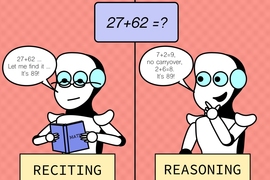
Reasoning skills of large language models are often overestimated

Technique improves the reasoning capabilities of large language models

Natural language boosts LLM performance in coding, planning, and robotics

Multi-AI collaboration helps reasoning and factual accuracy in large language models
Previous item Next item
More MIT News

MIT spinout Arnasi begins applying LiquiGlide no-stick technology to help patients
Read full story →
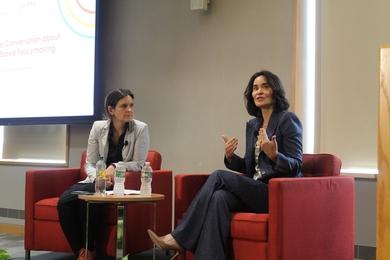
Groundbreaking poverty alleviation project expands with new Arnold Ventures, J-PAL North America collaboration

Study tracks exposure to air pollution through the day
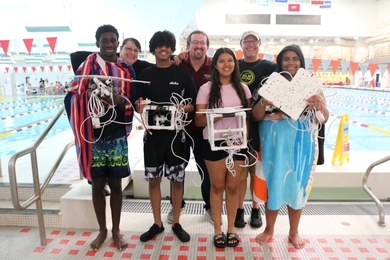
Edgerton Center hosts workshop for deaf high school students in STEM

MIT Global SCALE Network expands by adding center at Loughborough University

New transistor’s superlative properties could have broad electronics applications
- More news on MIT News homepage →
Massachusetts Institute of Technology 77 Massachusetts Avenue, Cambridge, MA, USA
- Map (opens in new window)
- Events (opens in new window)
- People (opens in new window)
- Careers (opens in new window)
- Accessibility
- Social Media Hub
- MIT on Facebook
- MIT on YouTube
- MIT on Instagram
Advertisement
Supported by
An Olympics Scene Draws Scorn. Did It Really Parody ‘The Last Supper’?
Some church leaders and politicians have condemned the performance from the opening ceremony for mocking Christianity. Art historians are divided.
- Share full article

By Yan Zhuang
A performance during the Paris Olympics’ opening ceremony on Friday has drawn criticism from church leaders and conservative politicians for a perceived likeness to Leonardo da Vinci’s depiction of a biblical scene in “The Last Supper,” with some calling it a “mockery” of Christianity.
The event’s planners and organizers have denied that the sequence was inspired by “The Last Supper,” or that it intended to mock or offend.
In the performance broadcast during the ceremony, a woman wearing a silver, halo-like headdress stood at the center of a long table, with drag queens posing on either side of her. Later, at the same table, a giant cloche lifted, revealing a man, nearly naked and painted blue, on a dinner plate surrounded by fruit. He broke into a song as, behind him, the drag queens danced.
The tableaux drew condemnation among people who saw the images as a parody of “The Last Supper,” the New Testament scene depicted in da Vinci’s painting by the same name. The French Bishops’ Conference, which represents the country’s Catholic bishops, said in a statement that the opening ceremony included “scenes of mockery and derision of Christianity,” and an influential American Catholic, Bishop Robert Barron of Minnesota, called it a “gross mockery.”
The performance at the opening ceremony, which took place on and along the Seine on Friday, also prompted a Mississippi-based telecommunications provider, C Spire, to announce that it would pull its advertisements from Olympics broadcasts. Speaker Mike Johnson described the scene as “shocking and insulting to Christian people.”
The opening ceremony’s artistic director, Thomas Jolly, said at the Games’ daily news conference on Saturday that the event was not meant to “be subversive, or shock people, or mock people.” On Sunday, Anne Descamps, the Paris 2024 spokeswoman, said at the daily news conference, “If people have taken any offense, we are, of course, really, really sorry.”
We are having trouble retrieving the article content.
Please enable JavaScript in your browser settings.
Thank you for your patience while we verify access. If you are in Reader mode please exit and log into your Times account, or subscribe for all of The Times.
Thank you for your patience while we verify access.
Already a subscriber? Log in .
Want all of The Times? Subscribe .
Stack Exchange Network
Stack Exchange network consists of 183 Q&A communities including Stack Overflow , the largest, most trusted online community for developers to learn, share their knowledge, and build their careers.
Q&A for work
Connect and share knowledge within a single location that is structured and easy to search.
Is the singular "they" acceptable in formal writing? [duplicate]
Possible Duplicate: Is there a correct gender-neutral, singular pronoun (“his” versus “her” versus “their”)?
I am linking to this post for reference.
The acceptability of "they" as a singular pronoun is growing. Has it grown to the point where it is acceptable in formal publications, such as journal articles, business proposals, or political speeches?
It seems to be that it is not quite there; most people are still too concerned about being negatively judged for it. However, the options of "one", "he or she", and "s/he" are similarly avoided for their cumbersome and pedantic tones. I often see either "he" or "she" used exclusively as an alternative, however, as there is no official stance on one pronoun or the other referring to either or, this opens the door for issues of implicit gender discrimination.
I try my best to skirt the issue altogether when I write, often dramatically revising paragraph -- and even paper-- structure. This, of course, is ridiculous. What is the best option for communicating the very commonly needed genderless singular personal pronoun in formal situations?
- writing-style
- singular-they
- 2 I'm not sure how this is different from the other question. Are you asking whether things have changed since nohat answered a year ago? – Robusto Commented Oct 15, 2011 at 18:37
- @Robusto: the other post seemed to be geared towards an informal setting. I wanted to know if the same advice held in a formal context. – OctaviaQ Commented Oct 15, 2011 at 19:20
- The other post answers that as well. Non-agreement of number is not for formal speech or writing. – Robusto Commented Oct 15, 2011 at 20:01
- 1 I'm backing @Robusto's position even more strongly than he does. I think this is a duplicate. – FumbleFingers Commented Oct 15, 2011 at 22:14
- If you do not see a value-add of this question over the linked one, then you are of course free to close it or vote to close it. – OctaviaQ Commented Oct 16, 2011 at 3:58
3 Answers 3
According to Merriam-Webster's Dictionary of English Usage , "they" as a common-gender pronoun is "perfectly well established, even in formal contexts."
- Actually, the singular they comes more from formal contexts than anywhere else. – candied_orange Commented Jan 10, 2016 at 2:23
If it's growing, it's because of the need, following social developments in the twentieth century, for a gender-neutral pronoun, but it's been used by respected writers for centuries. If you really can't bring yourself to use it, or if you fear it will annoy your readers, then putting the antecedent itself in the plural will often be the answer.
- As usual, Barrie is right on the money. Let me add that the meaning of prepositions has changed and probably will continue to change. For me to address you as "you" two hundred years ago would have seemed very odd and inappropriate. In the past this pronoun was reserved for addressing our "betters", and to use it in an egalitarian way would be very odd indeed. This T-V distinction has gone completely in English, but remains in other languages such as French or Spanish. Notably though, in both these languages it is slowly diminishing in importance as societies become more egalitarian. – Fraser Orr Commented Oct 16, 2011 at 18:02
I just signed up for a free temporary subscription to the Chicago Manual of Style. They are very clear that the singular they only acceptable in informal contexts. It is not acceptable in formal use. They also say that the universal "he" is unacceptable. They have a list of ways to avoid the issue by restructuring sentences. IMHO, it's pretty ridiculous. Can they be petitioned?
- 2 If you're seeking justification, seek no further than here: crossmyt.com/hc/linghebr/austheir.html – Barrie England Commented Oct 15, 2011 at 20:42
Not the answer you're looking for? Browse other questions tagged pronouns writing formality writing-style singular-they or ask your own question .
- Featured on Meta
- Announcing a change to the data-dump process
- Upcoming initiatives on Stack Overflow and across the Stack Exchange network...
Hot Network Questions
- Do I have legal grounds?
- Why is much harder to encrypt emails, compared to web pages?
- What kind of useless Stack Exchange Site is this?
- Does forgetful functor commute with limits?
- On vertical spacing
- Why is "hidden dependency" (required things not in parameter list directly) a disadvantage of "global variables", but not in "preserve whole object"?
- Is it possible to spend unconfirmed UTXO?
- Lindbladian superoperator decomposition
- Is it dangerous if an LED lightbulb fails to light up?
- Is there an easy way to put left right limits the Filling option?
- Camera on me and my computer screen all day
- Making an accessible list or array in Latex
- NSF grant: entire budget is just 1 person's salary
- Since we now have unlimited computation power (relative to historical norms), do we need to use statistical methods instead of simulations?
- What are the not-winglet wingtips on the CL-415?
- Help troubleshooting inconsistent pH measurements
- What is the historical origin of lone CR as a line terminator?
- How Does Our Current Understanding of QFT Affect Chemistry and Biology?
- The beginning of deeper mathematical abstraction
- What exactly did the BBC mean by teletext?
- Size of apartments in Sweden
- How to best handle many breadcrumbs with overflow menu
- Why is it plural for one example and singular for the second?
- What concerns are there with soldering stainless steel cable on electronics?

IMAGES
VIDEO
COMMENTS
Maintaining a formal voice while writing academic essays and papers is essential to sound objective. One of the main rules of academic or formal writing is to avoid first-person pronouns like "we," "you," and "I.". These words pull focus away from the topic and shift it to the speaker - the opposite of your goal.
When writing formal essays, there are rules of English grammar that we need to follow. Sometimes, we need to change perspective, and instead of writing in the first person and saying 'we,' we need to stay in the third person. So, what are the best alternatives to saying 'we?' There are many alternatives to saying … 10 Better Ways To Say "Our" And "We" In Formal Essays Read ...
I am writing a formal essay, based on the following prompt Differing points of view make life interesting. I am finding it hard to avoid using "our" and "we" in the essay. For example, in the
I'm finding it hard to replace personal pronouns in a formal essay. My sentence: To illustrate this more carefully, we will take the example of the 58th Presidential Election of the United States ...
Many writers believe the "no first-person" myth, which is that writers cannot use first-person pronouns such as "I" or "we" in an APA Style paper. This myth implies that writers must instead refer to themselves in the third person (e.g., as "the author" or "the authors"). However, APA Style has no such rule against using ...
I decided to use we in my essay because I had grown accustomed to seeing it in mathematics textbooks, so I assumed that it was formal enough. But the economics department says that it is not formal enough. Even though it seems acceptable to use we in some circles, it seems that it is a point of debate.
In most academic writing, first-person pronouns should be avoided. For instance, when writing a research project, words such as "I," "we," "my," or "our" should probably not be used. The same principle applies to lab reports, research papers, literature reviews, and rhetorical analyses, among many other academic writing genres.
Each essay should have exactly five paragraphs. Don't begin a sentence with "and" or "because.". Never include personal opinion. Never use "I" in essays. We get these ideas primarily from teachers and other students. Often these ideas are derived from good advice but have been turned into unnecessarily strict rules in our minds.
Writing in the first person, or using I and we pronouns, has traditionally been frowned upon in academic writing. But despite this long-standing norm, writing in the first person isn't actually prohibited. In fact, it's becoming more acceptable - even in research papers. If you're wondering whether you can use I (or we) in your research ...
Using "I" in Academic Writing. Traditionally, some fields have frowned on the use of the first-person singular in an academic essay and others have encouraged that use, and both the frowning and the encouraging persist today—and there are good reasons for both positions (see "Should I"). I recommend that you not look on the question ...
However, academic essays differ from personal essays; they are typically researched and use a formal tone. Because of these differences, when students write an academic essay, they quickly shy away from first person because of what they have been told in high school or because they believe that first person feels too informal for an intellectual, researched text. While first person can ...
However, "I" and "we" still have some generally accepted pronoun rules writers should follow. For example, the first person is more likely used in the abstract, Introduction section, Discussion section, and Conclusion section of an academic paper while the third person and passive constructions are found in the Methods section and ...
For clarity, restrict your use of we to refer only to yourself and your coauthors (use I if you are the sole author of the paper). In summary, I think a good balance of passive and active is considered good style, and the usage of I (where appropriate) is slowly becoming acceptable.
The best writing skills recommend not to use such pronouns. This guide explores how to replace 'I,' 'We,' or 'You' in an essay and the methods to avoid them.
34 We is used in papers with multiple authors. Even in papers having only one author/researcher, we is used to draw the reader into the discussion at hand. Moreover, there are several ways to avoid using the passive voice in the absence of we.
Just like choosing the proper attire to wear to a formal event, we need to use the right words while writing a formal essay. Here are some suggestions that can help you maintain a formal tone in your paper:
We could do this by simply reading example essays one by one and looking for the pronouns 'we' and 'I', counting the number of each pronoun and seeing which occurred most often. Another, easier and more accurate, way is to use a computer to search through a large collection of essays. Looking at texts in this way is known as corpus linguistics ...
In composition studies, a formal essay is a short, relatively impersonal composition in prose. Also known as an impersonal essay or a Baconian essay (after the writings of England's first major essayist, Francis Bacon ). In contrast to the familiar or personal essay, the formal essay is typically used for the discussion of ideas.
How do competent authors, in a refined and perhaps (slightly) formal way, refer to themselves without saying I? I've seen the term "this writer" somewhere. How is it with a native? Are there other ...
Why is it unprofessional to use the first person in a formal essay? I was writing an argumentative paper for my Language Arts AP class, and I got docked points for having "I" in there. Can you pl...
Wharton's Jonah Berger explains how writing style can predict future success, based on a study on over 40,000 college application essays.
What to consider when writing a graduate school application essay The essay portion of the application is your opportunity to broaden our admissions team's understanding of your abilities beyond what they can see on your transcript and resume.
What a GOOD writer can do, instead of just replacing every instance of 'you' with 'one', is write out their essay in such a way as to avoid referring to individuals at all.
People generalize to form beliefs about a large language model's performance based on what they've seen from past interactions. When an LLM is misaligned with a person's beliefs, even an extremely capable model may fail unexpectedly when deployed in a real-world situation.
We have the tools we need to stop the disease in 2024. Let's use them.
27 How compelled should I feel to use non-contracted forms ( do not rather than don't and so on) when writing in a rather formal text, say an academic paper? In one case I am afraid to seem too stilted, in the other, too casual. Are there good guidelines?
Some church leaders and politicians have condemned the performance from the opening ceremony for mocking Christianity. Art historians are divided.
The acceptability of "they" as a singular pronoun is growing. Has it grown to the point where it is acceptable in formal publications, such as journal articles, business proposals, or political speeches?